|
Title: Spiced Peaches - The Spock/McCoy Story
Author: Tempest, with the aid of Montgomery R. Scott (PlatoHomer2@aol.com)
Fandom: Star Trek: The Original Series
Pairing: Spock/McCoy
Spoilers: Anything having to do with the Original Series, the first seven movies,
discussion groups, various slash stories on the subjects, and you just might not be able to look at a piece of technology
the same way again.
Disclaimer: I think it’s obvious that I don’t own
Star Trek, otherwise I’d be rich and living in Hollywood, and there would have been a special episode dedicated
to the Spock/McCoy relationship. Also, although I use quotes from other people and recommend stories to prove points, this
essay represents my views on S/Mc, and how I perceive them individually and in a relationship together. It’s quite possible
other people disagree, but until I master the mind meld, I can only use my views.
Dedication: With special thanks
to Stef for doing the massive editing job required to turn this essay into what it is, as well as to Jazz Man for reading
the essay over to let me know if it made sense outside my brain. And to Holmes, for encouraging me to find my own place in
fandom, which has led to me becoming what I am. And Angel, I’ll curse you forever for making me write this, but I’m
glad you did. Thank you.
Author’s Notes: Recently, ship manifestos have been written for K/S, K/Mc, and K/S/Mc, and I figured that
S/Mc needs the representation and this is my life, so I might as well take it upon myself to write it.
Please forgive me the length of
this essay. I know Mark Twain said, “Brevity is the soul of wit,” but I’m a hell of a lot more verbose.
As a matter of fact, this is the longest thing I’ve ever written. Consider it my doctoral dissertation at TSU. If you
want something brief, read other pairing essays, such as the aforementioned K/S, K/Mc, or K/S/Mc. They’re concise, they’re
informative, and they’re humorous. Or, you can bear with me and read this. It’s your choice, but I do promise
to try and make it worth your while.
You’ll Need this later: “On the lam” is a colloquialism
meaning on the run, especially from the law. A bad pun goes “You might as well call me mint jelly, because I’m
on the lam.”
Without further ado:
Spiced Peaches, the Spock/McCoy Story:
Spock/McCoy has existed for many
years, usually as a rare story in a K/S zine. But the interest has always been there. When ASCEML was in its early days, online
S/Mc stories were just as rare as zine stories. But with the consolidation of the fandom, and help from the Great Bird of
the Galaxy, S/Mc has been nurtured into the second most prevalent TOS slash pairing.
And now for a necessary definition:
Spock/McCoyote: A person who is
a fan of Spock/McCoy slash; henceforth referred to as “coyotes” for abbreviation purposes.
About the characters:
(Quoted
verbatim from the Official Star Trek biographies of Mister Spock and Doctor McCoy found on http://www.startrek.com):
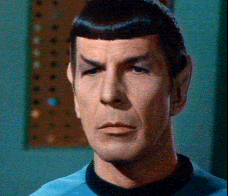
In this corner, in the blue trunks, hailing from
the Planet Vulcan, we have Mister “The Logical One” Spock:
Spock's mother, Amanda Grayson, was a
human schoolteacher from Earth and his father, Sarek, was a respected diplomat. For most of his life, Spock was torn between
his emotional human side and the stern discipline of his Vulcan half until his experience with the V'Ger machine-entity in
2271 and his later death and rebirth in 2286 broadened his perspective. As of 2267 he had earned the Vulcanian Scientific
Legion of Honor, had been twice decorated by Starfleet Command and held an A7 computer expert classification.
As a child, Spock had a pet sehlat, which
is a cuddly Vulcan bear-like animal with claws and fangs. His older half-brother, Sybok, who was ostracized from Vulcan because
he rejected the way of pure logic, was killed in 2292 after battling an alien entity at the galaxy's center that claimed to
be 'God.'
At age seven, Spock was telepathically
bonded with a young Vulcan girl named T'Pring. The telepathic touch would draw the two together when the time was right after
both came of age: once every 7 years all Vulcan males experiences pon farr, a powerful Vulcan mating drive which demands that
they mate or die. In 2267, however, T'Pring chose Stonn, a Vulcan, over Spock, and the Vulcan returned to the U.S.S. Enterprise
unwed. He did eventually marry in a ceremony attended by Lt. Jean-Luc Picard.
Because the young Vulcan chose to join
Starfleet, he and Sarek opened an 18-year rift over Sarek's hope his son would attend the Vulcan Science Academy. Spock was the first Vulcan
to enlist in the Federation Starfleet, serving aboard the U.S.S. Enterprise under Captain Christopher Pike as a lieutenant,
and later for James T. Kirk.
After the conclusion of the U.S.S. Enterprise's
first five-year mission, Spock retired from Starfleet and returned to Vulcan to pursue the emotion-purging of the kohlinar
discipline from the Vulcan Masters. Although he completed the training, Spock failed to achieve kohlinar because his emotions
were stirred by the V'Ger entity in 2271. He then reentered Starfleet and was eventually promoted to U.S.S. Enterprise captain
when that ship was assigned as a training vessel at Starfleet
Academy.
Spock sacrificed himself in 2285 to repair
plasma conduits that allowed the U.S.S. Enterprise and its crew to escape from the detonation of the Genesis Device by Khan
Noonien Singh; his radiation-wracked body was consigned to space but landed on the newly formed Genesis Planet and began regeneration.
Prior to his death, Spock had mind-melded with McCoy to transfer his katra, apparently intending for his longtime friend and
sparring partner to return it to Vulcan and perhaps be fully regenerated in the fal-tor-pan or refusion process, conducted
for the first time in generations.
In later years, Spock's work became more
diplomatic than scientific, initially remaining a part of Starfleet. In 2293, he served as Federation special envoy to the
Klingon government, paving the way for the Khitomer peace accords with Chancellor Azetbur, and disappointed in that his protégé,
Lt. Valeris.
In the coming decades as a civilian, in
2368, Spock secretly traveled to Romulus on a personal mission
to further the cause of Romulan/Vulcan reunification - a mission which shook up the Federation so that Captain Jean-Luc Picard
was sent undercover to determine his motives. On the same trip he was saddened to hear of the death of his father, Sarek,
but Picard's presence allowed Spock a final last solace thanks to an earlier Picard-Sarek mind meld. Spock remained to work
with the Romulan underground and in 2369, helped arrange the defection of Romulan vice-proconsul M'Ret to the Federation to
pioneer an escape route for dissidents.
Spock carried a life-long interest in
art, music, literature and poetry from many worlds, especially Terran, and played both tri-dimensional chess as well as the
Vulcan lute or harp and a keyboard harpsichord.
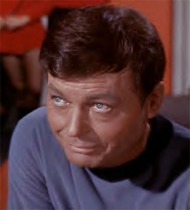
And in the other corner, also in blue trunks, hailing
from the Good ol’ Southern
Georgia, we have Doctor Leonard “The Emotional One” McCoy:
Nicknamed 'Bones' by his longtime friend
and commander, Captain James T. Kirk, McCoy replaced Mark Piper as chief medical officer in 2266 on the original five-year
mission but clearly became the most renowned. By that first year he had already won the commendations of Legion of Honor,
awards of valor, and was decorated by Starfleet Surgeons.
His temperament was sometimes argumentative,
a cynic's outer crustiness masking deep caring beneath the surface. His "old South" roots led to the old-time physician manner
of doctoring, with a Southern accent that was most apparent when under stress. He distrusts transporter technology and travels
by shuttlecraft whenever possible.
McCoy was married once and later divorced,
a relationship never discussed except for his one daughter, Joanna, who later graduated from nursing school. In the era before
ship's counselors, McCoy played his role as psychologist expertly to the hilt - especially for the ship's two senior officers.
As such an emotional watchdog he was not afraid to take on his captain, but it was his running battle of wits with Spock which
became legendary. Spock showed his true feelings, though, as when inviting McCoy down to Vulcan for his "wedding" and in storing
his katra with him before a known suicidal saving of their ship before the Genesis detonation.
McCoy contracted the always-fatal xenopolycythemia
and retired from Starfleet in 2369 to spend his remaining days on the asteroid ship, Yonada, and that world's high priestess,
Natira - whom he soon married. By exploring Yonada's computers, Spock found a cure for xenopolycythemia and McCoy left Natira
to return to the service. Earlier, McCoy had been infected with the strange 'aging' virus that infected the Gamma Hydra IV
landing party.
After the U.S.S. Enterprise's triumphant
return from its five-year mission, McCoy retired from Starfleet, grew a beard and went into virtual seclusion with a rural
practice, only to be forced back to duty by Kirk and Admiral Nogura when V'Ger threatened Earth in 2371. After that he continued
through the years of renewed Enterprise service with Kirk
until at least the Khitomer peace talks of 2293, having survived imprisonment with him on trumped-up charges at the Rura Penthe
mining prison when he could not revive assassinated Klingon Chancellor Gorkon. Spock's deposit of his katra in 2385 had nearly
driven him crazy and landed him in Starfleet detention until the refusion took place, whereupon he delighted in the Vulcan's
reeducation process.
As a retired admiral he remained active
in his later years, serving at the age of 137 and shuttling aboard the U.S.S. Enterprise-D in 2364 in his role of inspecting
medical facilities on new starships.
McCoy was an active practitioner well
before his Starfleet days, of course. In 2253, some 12 years before he signed aboard with Kirk, he had developed a neural
grafting procedure employing the creation of axonal pathways between the graft and a subject basal ganglia that was still
the practice over a century later. He had also been stationed on Capella for a few months and knew the intricate customs of
the Ten Tribes there.
The Relationship:
Flavius Maximus: “Are they enemies?”
Captain Kirk: “I’m not sure they’re sure.”
From Episode #43: Bread and Circuses. That exchange says it all.
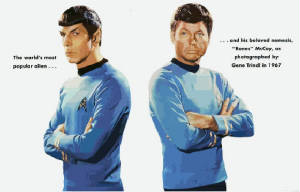
The above picture
has appeared all over the Internet for years without complaint from the fans over the word “beloved” because it’s
simply the truth.
Spock and McCoy
have an extremely peculiar relationship. They’re best known for arguing over everything, usually over which is supreme:
Logic or emotion, and how both can be applied to current and prior missions. This is mostly due to the fact that Gene Roddenberry,
when creating the characters, had a theory that the two of them combined, much like Yin and Yang, were whole. A person couldn’t
exist without logic any more than he could exist without emotions. This is why they’re constantly filmed standing next
to one another. This is why Kirk relies on both, not one of them, for his most complicated decisions. And this is why they
work best as a team.
However, despite
the above, the arguing reaches a much more personal level. One of the most famous arguing scenes occurs when Spock has decided
that it would be better to sacrifice his life than to allow the crew of the Enterprise to attempt to rescue him from the giant space
amoeba about to explode, in episode #48: The Immunity Syndrome:
Spock: “Captain, I recommend you abandon the attempt. Do not risk
the ship further on my behalf.”
McCoy: “Shut up, Spock! We’re rescuing you!”
Spock: (sarcastically) “Why thank you *Captain* McCoy.”
This arguing
has become the cliché in stories to the point that many fans of the show, and of other slash pairings, believe them to have
truly hated one another. This is an oversimplification of a very complex relationship. They’re beloved nemeses for a
reason. They argue, sometimes to the point of hurt, but they always mean well and it’s often colored with affection.
If one takes the time to analyze the arguing, it is either a philosophical difference, which often people can have without
hating those of different philosophies (I direct your attention to any Democrat married to a Republican), or, as it appears
in many episodes, the arguing is done as an attempt to change and improve the other. McCoy argues with Spock about his Vulcan
philosophies to force him to analyze his own thinking processes, and to perhaps make him acknowledge his human half. Spock
argues with McCoy’s emotionalism because he believes that logic is the way of life and McCoy might be better off with
that philosophy as well. Also, there was discussion on ASCEML about their interaction
with each other in comparison to their individual interaction with Kirk. They
were both perfectly adult in dealing with him, but acted like squabbling siblings with each other.
During the arguments, McCoy often makes a reference
to Spock’s Vulcan physiology, such as his green blood or his pointed ears. This has led certain factions of fandom to
believe that they don’t just hate one another, but McCoy is a blatant racist and shouldn’t have been allowed to
be on the ship, that he was a terrible person contrary to Star Fleet ideals.
To clear up this gray area, I’d like to
take the opportunity to point out that just about every person on the show took a crack at Spock’s Vulcan appearance
or physiology. Kirk makes continuous cracks about Spock being a computer, and he demonstrates in This Side of Paradise (Episode #25) that he’s more than capable of dredging
up insults to hurt Spock, the likes of which McCoy had never used. Also, those
insults were hurled to deliberately stir up anger. Anytime the Vulcan was insulted,
the entirety of the human crew would laugh, all thinking it an appropriate and funny occurrence. Furthermore, Spock was more
than aware that such exchanges brought pleasure to his crewmates and would often encourage the jibes with coy responses of
his own.
Kirk: You’d make a splendid computer, Mister Spock.
Spock: (Eyes widening in almost delight) That is very kind of you, Captain.
It also must be noted that Spock gave as good
as he got, at any point in time. He was never above explaining how Vulcan, be it societal beliefs or physiology, was superior
to human. He is also known to have started the arguments, not just reciprocated, and this is always shrugged off as a necessary
pride in his culture, or an attempt to engage in banter for amusement. If Spock is not racist, then neither is McCoy.
Despite the arguments, which become more and
more like banter as the years continued, and often reek of sexual tension, the two are quite obviously friends. Although many
in fandom believe that the only tie between the two is their mutual friendship and loyalty to Captain Kirk, this theory is
false, because it doesn’t account for the obvious affection they hold for one another when one is in danger or in pain.
It doesn’t take into account the time, on screen, that they spend together in the absence of Captain Kirk, and it ignores
the obvious concern they have for the other’s well-being. Their banter, although simple on the surface, hides a multitude
of emotions and complex ties, sometimes used to mask the true affection between the two.
Spock: (over the communicator) Spock, Captain. I trust all has gone well.
McCoy:
(obviously surprised and delighted) Spock, are you alive?
Spock: An illogical question, Doctor. Since obviously you are
hearing my voice.
McCoy:
Well, I don’t know why I was worried. You can’t kill a computer.
Within
that repartee from Episode #45: A Private Little War, a number of things become
evident. McCoy’s concern for Spock, having been separated from him earlier and unable to maintain his primary care,
comes through first and foremost. He publicly expresses this emotion. Spock baits him. McCoy, unable to resist the challenge,
makes an offhand remark about Spock’s heritage, comparing him to a machine. Nowhere in this exchange is there hatred.
Only the complex elements of a male relationship. It’s more difficult to show touchy-feely emotion from one man to another,
especially in the military, when one individual is from a culture without open expression of emotion and the other grew up
in what was most likely a conservative household. They found other ways to express their affection toward one another.
“Don’t tell Spock I said he was the best first officer in
the Fleet.” –McCoy to Kirk in Episode #29: Operation: Annihilate!
Although this
differs from most people’s take on friendship, it worked well for them. And Star Trek is based on the principle that
just because something is different doesn’t mean that its existence is invalidated. So it is with their friendship.
Beyond the Edges of Friendship:
“Spock/McCoy is more like a match to damp moss: you can get it
to burn, and it will burn a long time, but you have to pay attention and work at it.” –Jonk
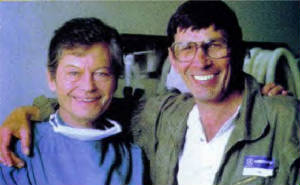
A sexual relationship between Spock
and McCoy might be one of the most complicated topics of discussion in slash. Most people cannot agree that it would happen
at all. It’s an easy task for most people to imagine McCoy as a lesser being, and Spock more highly. And because of
this, people in S/Mc fandom have been known to overcompensate for McCoy, and sometimes to chastise Spock unnecessarily. It
gets pretty messy. There have, at times, been divisions, viewing McCoy as the better partner, the more understanding, the
more in love, and it is Spock who takes on the “jerk” role, but in discussions and fiction alike, this issue seems
to have resolved itself, and is no longer a concern. Fandom has found its balance.
I
can easily see McCoy developing some deep feelings for Spock, but I have a very hard time imagining the reverse.” –
Killasandra
This was a fairly common opinion of Spock/McCoy
back in the early days of the Internet and of Alt.Startrek.Creative.Erotica.Moderated (ASCEM), the major Star Trek fan fiction
list. And because of this sentiment, the subject of who’s who, who’s what, who loves the most, who’s been
bad, who’s been good, who’s God and who’s not gets to be a sore spot for many, because these discussions
tend to lead to flaming, arguments, and over all retract from the enjoyment of slash as a hobby or creative outlet.
The reason, I believe, most people are able to
see McCoy developing feelings for Spock is because he’s generally seen to wear his heart on his sleeve. This is actually
a rather shallow interpretation. Despite all his pride in human emotionalism, he tends to speak very little of his personal
life. He may be the only person on the Enterprise who keeps his life more private than Spock himself. And Spock’s
privacy, his Vulcan behavior, is what leads many to have difficulty with the concept of him loving McCoy back. But it makes
sense. It has its own internal logic.
For all their arguments, all of their surface
differences, the two are quite similar. Both are men of peace in a military world. Spock is bound by Surakian philosophy and
McCoy by the Hippocratic Oath. Both are men of science, who care more about research than military procedure. And since they
wear very similar clothing, they could share a closet and very few people would notice.
The best description of the Spock/McCoy relationship
is that of an old married couple. They argue about everything, because they’ve been around one another so long that
they know everything there is to know about one another. For some, it is difficult to imagine how they first became involved,
but at the same time, it is impossible to imagine them apart. This is actually a compliment, because only the most stable
of relationships can achieve that level.
But despite their long exchanges, the intimacy
between them comes not only in the form of words, but in the form of physical contact. Vulcans have touch telepathy. As a
result, they tend to avoid touch, since it results in mental contact with which they are not comfortable. But despite this
fact, the amount of casual touching between Spock and McCoy is enormous. And McCoy initiated this contact only about half
of the time. Spock touches McCoy just as often, demonstrating a desire to be close to him. And when telepathy is involved,
the contact becomes mental as well, and this presents some interesting interpretations in slash fiction regarding their relationship.
Canonically, McCoy has a way of attracting mental
attacks the same way bright lights attract insects. It just happens. And this has led to two camps in Spock/McCoy fiction,
both with extremely valid points. The two are those that think McCoy could handle a mental bond, and those who think he cannot.
It is fascinating, the way they differ yet both
are completely valid from canon. Those who think McCoy is capable of a bond with Spock believe that he’s strong enough
to overcome his prior mental invasions out of a desire to be fully intimate with Spock This relationship has intense intimacy
of both mind and body, and achieves its highest point when the two are merged in all ways, creating almost, another plane
of existence, where they can be together, free of the rest of the universe, for a few minutes, in bliss.
But those who think that McCoy just can’t,
for emotional or physical reasons, enter into a bond with Spock present an extremely interesting look into the relationship.
They end up written as most human pairings are, to a point. They rely more on verbal and physical communication to get points
across, but the desire on Spock’s part for mental joining is never ignored. It’s simply transferred elsewhere.
Either way, it’s always an interesting
look at their more personal relationship. And what’s nicer, still, about it is that either way, they have a stable relationship.
And this is what Spock/McCoy slash is all about: Stability.
This might seem strange, due to the volatile
nature of their arguments, but it makes sense, truly. Spock and McCoy argue to get points across. They argue in attempts to
make the other see a point of view, and to perhaps change the other into what one views as a more beneficial lifestyle. But
in all times, they work together, and they’re better off together than separately. And that’s the nature of a
stable relationship.
S/Mc is a very complex relationship for many
to grasp. And that’s because it’s an egalitarian’s wet dream. The two are equal on all fronts. Although
they argue about who’s ultimately right when it comes to the nature of the universe, neither has a true desire to be
superior. And this provides for an interesting setting. Although Spock outranks McCoy, McCoy doesn’t give a camel’s
hump about rank and so that’s not an issue. Neither is McCoy’s authority as a doctor, since Spock makes it plain
what he thinks about non-Vulcan medicine. Without these professional aspects clouding their relationship, the two are free
to revel in the equality of all things.
And it happens, because despite Spock’s
Vulcan heritage, and his Vulcan physiology, when he’s with McCoy, he’s able to embrace his human heritage without
any shame. And the result is a freedom for both of them, the likes of which is never experienced outside of their relationship.
S/Mc isn’t about a big story-book romance,
or about fulfilling destiny, or even about the leeway in a relationship between friends. It’s about what works and what
doesn’t. S/Mc works. It works because they care for one another in a way they’ve never cared about anyone else
before. It works because despite their arguments, they know they can depend on one another. They know that if they should
fail, there will be no gloating from the other side, and no attempts to rub it in the other’s face when a mistake occurs.
It works because they have complementary minds
and complementary hearts. They can find a means of setting up a future that’ll be comforting, stable, and what they
desire. And this is what makes it so strong.
If their love weren’t strong, every insult,
every jibe could be the one to push the other over the edge and destroy the relationship. But this never happens, because
they’re comfortable enough together to know that the insults and the arguments are just on the surface. Their love is
stronger than a few words.
To sum up S/Mc and why it makes sense, I need
to quote what a mentor of mine told me years ago.
My husband and I on the surface didn’t look like we made sense at all. I was the intellectual type, and he was
a builder. He was big and strong, with skilled hands. And I read and wore glasses. And people used to always ask us how we
managed to make life work, because we were so different. Bt the thing is, we weren’t different at all. We wanted the
same things in life; we just had different ways of expressing it. And that’s what makes a stable relationship. Surface
differences are meaningless. It’s the goal of the heart that matters. We had over fifty years together, and if you find
yourself in a situation like this, that’s when you’ll know it’s the real thing too.
How I See Their Sexuality:
No two people see sexuality the same way, much
like no two people can agree about pizza toppings. Since this is my essay, I thought I should include a short section on how
I, personally, view their sexualities. I know that on my views of both, I tend to differ from the more mainstream views of
them each being bisexual to different degrees.
Spock: I see Spock as being specifically homosexual. However, I don’t think that he was always aware of
this fact. I believe that when he was younger, and had truly come to understand the pon farr, he realized he was not only
not attracted sexually to T’Pring, but realized that he was unable to respond sexually to females. With the strict rigidity
of Vulcan culture, homosexuality would not have occurred to him, so he decided that he was simply an asexual being, and that
when the pon farr came, he would deal with it accordingly with T’Pring.
However, when he left Vulcan and was able to
witness other cultures, with the heavy influence from human culture, he began to realize that there was a vast difference
between not being attracted to women and not being attracted to anybody at all. And during these years, he came to terms with
his homosexuality. It is important to note that in any situation where there is a woman involved with Spock, he is not in
complete possession of his faculties at the time. With Leila Kalomi in This Side of
Paradise, he was under the influence of spores. With Zarabeth in All Our Yesterdays,
he had reverted back to the Vulcan way of being of 5,000 years prior and was under primitive urges. With T’Pring, from
Amok Time, he was under the effects of the pon farr and the rest has been explained
regarding their relationship. Any interaction with Nurse Chapel was unrequited on her part, and the only time they kissed
was because they were being forced by the Platonians in Plato’s Step Children.
And the seduction of the Romulan Commander in The Enterprise Incident, was made
quite clear canonically, that it was purely as part of espionage. His later pon farr with Saavik in Star Trek III: The Search for Spock was three-fold nonconsensual: He was under the effects on the pon farr, he
had reverted physically back to the age of a teenager, and his katra was in McCoy’s head at the time, far removed from
the situation. The weird thing about the pon farr with Saavik is that he should’ve reverted to his late 20s or early
30s for his first pon farr, not as a teenager.

And in various episodes, Spock
actually displays his contempt for women, more specifically, when they behave in overtly feminine ways, or display qualities
associated with femininity. This doesn’t necessarily indicate homosexuality. Such comments arise when he speaks to Doctor Leila Kalomi in This Side of Paradise, (Example: I have never understood the female capacity
to avoid a direct answer to any question), as well as the evident disgust in his voice when he explains the female personality
given to the ship in Tomorrow is Yesterday.
This behavior, to
me, is not indicative of an individual with the slightest of heterosexual inclinations. However, the behavior he displays
towards Doctor McCoy demonstrates his homosexual urges. And coupled with his actions, he’s what could be classified,
in today’s terminology, as a “straight-acting gay.” This means that Spock is a homosexual who does not participate
in any stereotypical gay behavior, or participate in whatever remains of gay culture in the 23rd Century.
McCoy: My view on McCoy’s sexuality is somewhat peculiar as well, and since his marriage and divorce are
never explicitly discussed, it gives me a bit of leeway. However, my views don’t change when this is taken into account.
I see McCoy as a somewhat late-blooming homosexual man. I believe, truly, that due to his upbringing in the Deep South, an area which
is conservative now, was conservative when Star Trek was created, and most likely remains conservative in the future, he sublimated
all homosexual urges, and forced himself into a heterosexual lifestyle.
Taking the divorce into account, the specific
reason was never stated. Although pro-novels have taken the view that his ex-wife was having an affair, there is a view amongst
slashers, with which I agree, that they divorced because he was gay.
McCoy has far fewer relationships with women
than Spock does in canon. Three, specifically, four counting Eleen. Aside from his ex-wife, the first relationship is with
Nancy Crater, an old flame from his past, in The Man Trap. Although it becomes
clear that he has feelings for her, it’s Kirk who assumes those feelings are sexual, instead of just fondness. McCoy
says nothing of the sort. His next relationship, with Yeoman Tonia Barrows in Shore
Leave, is never explicit and never results in anything more than simple flirtation. Flirtation is easy, and can be achieved
as part of an illusion of heterosexuality, or out of habit, or just for fun. It states nothing of a person’s true sexuality.
And his last relationship, when he marries the High Priestess Natira in For the World
is Hollow and I Have Touched the Sky, is nothing more than a response to great emotional stress. He’s dying and
he just wants a simple out, without having to hurt those he truly cares about. In the episode Friday’s Child, he wins over Eleen’s affection due to his treatment of her as a Capellan, but it becomes
clear that he has no such feelings for her.
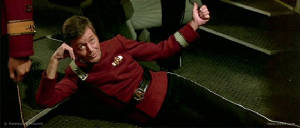
Once McCoy was able to analyze
his feelings, he realized that he was not bisexual, but homosexual. And from then on, he remained in a homosexual relationship,
free to act out his true desires. He, too, spends most of his canonical life as a “straight-acting gay,” although
there are times when he’s downright flamboyant, such as his posture during the Kobayashi Maru Test in Star Trek II: The Wrath of Khan and his off-duty wardrobe in Star Trek
V: The Final Frontier.
As I said, these are just my opinions, but since
it’s my essay, I feel I have an obligation to show how I view the characters, since it colors my analysis of episodes.
A Spock/McCoy Run-Through of the Episodes:
And now for my favorite portion of the essay.
The portion wherein I go through each episode of Star Trek, find the slashiest ones and pull them apart in an attempt to prove
Spock/McCoy to others. There are a lot of them, so consider this your warning now: Abandon
Hope All Ye Who Enter Here.
Episode #6: “The Man Trap”:
There
are two relevant scenes in this episode indicative of a Spock/McCoy relationship. The first is when the Salt Vampire, disguised
as McCoy, is asked to take care of the Truth Serum injection of Doctor Crater. Spock insists upon accompanying him, after
having watched its defense of the creature, and for fear of arousing suspicion, the Salt Vampire agrees. In the very next
scene, Kirk arrives in Sickbay to find Spock with head injury.
Spock:
It wasn’t McCoy. It was the creature. It hit me. Crater grabbed my phaser. I’d wondered about McCoy. Doubt had
crossed my mind.
To the generally observer,
the creature was behaving much like McCoy would have in a situation of hurting another sentient being. The fact that nobody
else in the conference room doubted McCoy, but Spock still did indicates that he had specific knowledge of McCoy that others
would not have been privy to, and this is what fostered his doubt.
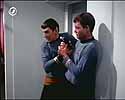
The second scene is when Spock simply
barges into McCoy’s quarters with no warning. This aside, he encourages McCoy to shoot the creature, disguised as Nancy
Crater. When McCoy refuses, he attempts to take the phaser away, but is not willing to inflict any sort of harm upon McCoy
in order to save Kirk’s life. Instead, he begins to inflict pain upon the creature, allowing it to hurt him. Once he
is hurt, and only then, does McCoy realize that the creature wasn’t Nancy Crater, and he finally fires on it, killing
it. When Spock realizes, a look of relief crosses his features.
Episode
#12 “Miri”:
This episode is rather simplistic in its evidence,
and it can be summed up in two scenes. Spock and McCoy are working themselves very hard in order to find a cure to the disease
which has infected the landing party. They create an experimental serum, but are uncertain as to its results. When Spock leaves,
McCoy takes the opportunity to inject himself with it. The result is incredible pain and McCoy calls out Spock’s name,
despite the fact that as far as he knows, the Vulcan is too far away to hear.
Spock comes rushing in and drops to his knees
to examine him. He checks McCoy’s reponses and then puts McCoy’s hands on his chest, before covering them with
his own. Considering that the hands are so important and intimate to Vulcans, this action is
too peculiarly intimate for two who are simply friends.
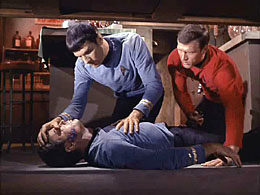
“Then when they notice the tumors on McCoy's face are fading, Spock
SMILES! :)
And he shakes his head and there is this "god, I love this man" look on his
face even as he's saying he
doesn't understand the medical mind. (and he's a
scientist, mind you) :)) Now *that* was some serious S/Mc sub-text.”
–LuvDS9
Episode #17 “Shore Leave”
In this episode, McCoy is killed by the Black
Knight in a joust. When he falls, and Barrows cries out, Kirk and Spock come running. Spock kneels down beside McCoy, examines
him, and then holds his hands. When McCoy arrives later, on the arm of not one, but two showgirls, there is first joyous surprise
on Spock’s face, which then deteriorates into a jealous look, similar to
Barrows’ upon seeing the same sight.
Episode
#19 “Arena”:
McCoy: Rank hath its privileges.
Spock: Doctor...you are a sensualist.
McCoy:
(Smiling) You bet your pointed ears I am.
Although this might sound like simple banter,
upon viewing it, it reeks of flirtation. In fact, during this exchange, McCoy takes the opportunity to give Spock a visible
once-over. And then later during the episode, when Spock realizes that his logic has its limitations, he relies on McCoy’s
emotionalism to attempt to solve the problem and save Kirk’s life.
And while they watch Kirk’s fight for survival,
McCoy practically has his arm around Spock. The number of times he casually touches Spock during this period is incredible,
especially since Vulcans prefer not to be casually touched. Yet, Spock has no objection.
Episode #22 “The Return of the Archons”
Spock has woken up in a strange holding area,
to find McCoy missing. When he arrives, it becomes very evident that the Doctor’s been absorbed into the Body by Landru.
There is no recognition in his eyes and the only thing he is capable of understanding is the connection between the body and
Landru. When Kirk is taken, he orders Spock to watch him. Spock attempts to question McCoy, to no avail. This leads to an
attempt at the Vulcan mind meld, which is ultimately unsuccessful. And it is very clear Spock is not pleased with this.
After the remaining crew members and the rebels
from the planet make their plan to overthrow Landru, McCoy becomes aware of it, and he begins to call for the help of the
Lawgivers. The only solution is for Kirk to knock McCoy unconscious, which he does. And Spock is forced to watch.
When the Law Givers arrive and they need to steal
their clothing, Spock, out of character, decides to punch the Law Giver, rather than using the nerve pinch. It’s somewhat
common knowledge that hitting something is a good way of relieving stress. When Kirk calls him on his use of a punch, stating
that it is “somewhat primitive,” Spock glares at him with a look that essentially says, “Shut up, and don’t
ask questions.”
Episode #29 “Operation: Annihilate!”:
From the moment they learn that Spock has been
infected with the parasites, McCoy is over-protective of him. He refuses to let him go on missions, he bites Kirk’s
head off in an attempt to keep Spock safe, and he even takes to trying to scan Spock in secret in an attempt to monitor his
health. And he grows extremely angry every time Spock suggests sacrificing himself in an attempt to rid the universe of the
parasites.
When it comes to testing the spectrum of light
on a host, McCoy is initially unwilling, although Kirk is insistent. When Spock volunteers as well, McCoy finally relents,
but insists upon getting Spock a pair of protective goggles in order to protect his optic nerves. Again, Spock and Kirk disagree
with McCoy’s medical opinion. But this time, the doctor is more hesitant to allow it. Finally, he relents and sets Spock
up in the testing booth. As soon as the door is closed, and Spock is out of earshot, he manages to get his emotions out.
McCoy: (Pissed and worried) Mister Spock is the best First Officer in
the Fleet.
Kirk:
Proceed.
The test goes well enough, in the sense that
it is successful in destroying the creature, a victory about which both Spock and McCoy are very happy. However, the test
fails miserably in the sense that Spock finds himself blinded as a result.
Kirk: Spock, are you all right?
Spock: The creature within me is gone. I am free of it, and the pain.
(Bashes into a desk) I am also...quite blind. An equitable trade, Doctor. Thank you.
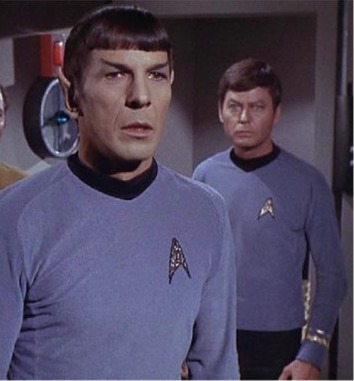
Within two minutes of the revelation of Spock’s blindness, Nurse Chapel
comes in with the results from the first experiment. The pain in McCoy’s face is apparent as he reads through them,
realizing that Spock’s blindness was unnecessary. And as soon as he reveals this fact, the guilt sets in.
McCoy: I didn’t need to throw the blinding white light at all.
Spock...I...
Spock: Doctor, it was my selection as well. What’s done is done.
However, despite his handicap, Spock does his
best to alleviate McCoy’s guilt and concern, letting him know that he does not hold him accountable. This is a somewhat
strange reaction for anybody to have, when learning of a permanent and unnecessary disability caused by another. The most
logical conclusion to draw is that Spock’s deep feelings for McCoy allowed him to forgive so quickly.
Near the end of the episode, Spock’s eyesight
has been restored due to a hereditary second eyelid, which Vulcans tend to forget they have.
Kirk: Mister Spock, regaining eyesight would be an emotional experience
for most. You, I assume, felt nothing.
Spock: On the contrary Captain. I had a very strong reaction. My first
sight was the face of Doctor McCoy bending over me.
McCoy:
‘Tis a pity brief blindness didn’t increase your appreciation for beauty, Spock.
That above exchange has no animosity within it
whatsoever, and it’s accompanied by an exchange of very fond looks between them. And it leads to the question, “Just
what was his strong reaction?”
At the very end of the episode, McCoy asks Kirk
to remain silent about his earlier compliment of the Vulcan, stating it a second time. Spock turns around, a smile on his
face, and says, “Why, thank you Doctor McCoy,” then he smiles at him again, twitches his eyebrows in his usual
sign of humor, and turns around once more.
Although Kirk says McCoy must have forgotten
about Spock’s Vulcan ears from concentrating so much on his eyes, this is an impossibility based on two facts. 1) McCoy’s
a doctor. There’s no way he’d forget on a professional level about Spock’s hearing. 2) Considering the amount
of time McCoy spends looking at and talking about Spock’s ears, there’s no way under the twin suns of Vulcan he
forgot. The only logical explanation is he remembered and wanted Spock to know his true feelings, expressed, if only, under
the guise of professional credentials.
Episode #32 “Friday’s Child”:
This episode contains one of the slashiest S/Mc
moments of all time. While Kirk, Spock, and McCoy are on the lam with the pregnant wife of the late Teer, McCoy makes an attempt
to force her to accept his help, realizing that the baby’s arrival was imminent. . She refuses to allow him to touch
her, to the point of slapping him twice. Finally, he grows upset enough to use a rather unorthodox method of hitting her back.
Within her own culture, this forces her to respect him, for he was not afraid. She then begins to flirt with him, so much
to the point of picking up his hand and stroking it with hers. Then Spock shows up. When McCoy notices him, he yanks his hand
back as though he’d been caught cheating, and Spock has an expression on his face verifying that opinion.
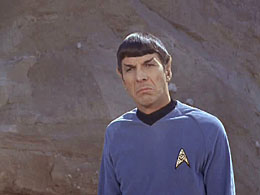
For the rest
of this episode, anytime McCoy has a connection with Eleen, the young woman, specifically when it comes to the point of her
referring to the newborn as “their child,” or naming him after McCoy, Spock reacts, not with their usual arguments,
but with snide remarks indicative of jealousy.
Episode #34 “Amok Time”:
This is the be-all, end-all episode of Spock’s
sexuality and no essay on Spock/McCoy slash would be complete without it. There are many possibilities that exist within this
episode. The first is that canonically, it frees Spock both of his mental bond and his legal and moral obligation to T’Pring.
McCoy: Oh Captain! Got a minute?
Kirk: A minute?
McCoy: It’s Spock. Have you noticed anything strange about him?
Kirk: No, nothing in particular. Why?
McCoy:
Well, it’s nothing I can pinpoint without an examination. But he’s become increasingly restive. Were he not a
Vulcan, I’d say nervous. He also hasn’t been eating.
Notice that it’s McCoy who notices Spock’s
behavior patterns. And since nobody else has seemed to notice his strange behavior prior to his request for a leave of absence,
it suggests that McCoy has private interaction with the Vulcan nobody else has, which has allowed him to see these changes
occur.
And when Chapel brings him the homemade plomeek
soup, McCoy makes a point of publicly humiliating her actions, much the same way a spouse would do when a secretary is getting
too attentive. The jealousy is most apparent.
Furthermore, the invitation he extends to McCoy
to join him at the koon-ut-kal-if-fee is indicative of at least friendship, and possibly more, and McCoy’s genuine acceptance
shows that the feelings are mutual.
Another indication of emotions on behalf of McCoy
toward Spock occurs when it’s revealed that T’Pring is his wife. The expression that McCoy has on his face when
this is revealed is exactly the same as that which Nurse Chapel has. Nurse Chapel, of course, is the Alpha and Omega when
it comes to showing love for Spock, so his expression only highlights the depth of his emotions for the Vulcan.
On the planet, McCoy expresses grave concern
over Spock’s status, to the point of nearly inviting the wrath of T’Pau in an attempt to call off the entire fight.
And this concern is what leads to his brilliant plan of lying to Spock’s entire family, and what led him to saving the
day.
On the note of a spontaneous mental bonding:
Spock didn’t actually come into physical contact with Kirk during the kal-if-fee. They fought, using weapons, but not
their hands. Even when Spock’s standing over Kirk’s body, he’s holding the sling, not Kirk himself. When
McCoy rushes in, he pushes Spock out of the way, and this is the first physical contact Spock has had in a long period of
time. If a spontaneous bonding were to occur, it would be at this moment, not later, when Spock touches Kirk.
Off the topic of a spontaneous mental bonding:
The likelihood that this small amount of blood sport was enough to satisfy Spock’s hormone cycle for the next seven
years is unlikely. What is more likely is that it merely stalled his cycle, and that sometime soon, it erupted again. Since
this was never addressed, he most likely found somebody with which to satisfy the fever.
And for one more quote:
Spock:
It is undignified for a woman to play servant to a man who is not hers.
Since he has no qualms with the way McCoy dotes
on him throughout the series, this either implies that A) He thinks men can do as they please and women are servants. This
is not particularly likely, however, because he shows Uhura nothing but the highest respect in the series because of her professional
aptitude, and he has no qualms telling off people who intrude in his privacy, regardless of gender; or B) Spock is McCoy’s.
Episode #39 “Mirror, Mirror”:
Note: MU is an abbreviation for Mirror Universe
and is a way of distinguishing characters from the MU from our normal characters.
This episode provides rare insight, not just
into S/Mc in the normal Star Trek universe, but into the possibilities of S/Mc in a parallel universe, as well.
One of the most noticeable aspects of this episodes
that in a parallel universe where any heterosexual pairing could occur, and to some extent did, with the Uhura/Sulu and the
Kirk/Marlena Moreau, neither Spock or McCoy finds himself in a relationship, on screen. This is particularly odd since they
are two of the most important men on the ship, and to be involved with either of them would give the fortunate female officer
immense power and protection. This could very well be because the two of them are involved with one another.
Furthermore, when Spock realizes that something
is wrong with the landing party, although he turns to Kirk, it’s not to ask what happens. It’s obvious he doesn’t
trust Kirk at all in this universe. It’s only to capture him and bring him to sickbay as a means of isolating him for
his convenience.
Kirk: Are you going to shoot me now, Spock? I thought I had until dawn.
Spock: I shall make that decision. Since you returned from the planet,
you’ve behaved in a most atypical and illogical manner. I want to know why.
Kirk: Shoot. You’re wasting time.
Spock:
I shall not waste time with you. You’re too inflexible, too disciplined, once you’ve made up your mind. But Doctor
McCoy has a plenitude of human weaknesses, sentimental, soft. You may not tell me what I want to know, but he will.
The fact that the Mirror Universe Spock is so
certain of the contents of McCoy’s mind is curious, and at least suggestive of a familiarity with his mind. Furthermore,
when the landing party begins to fight with him, the MU Spock, while attempting to hurt Kirk and Scotty, simply pushes McCoy
out of the way, in the same manner he does with Uhura. It is obvious he does
this to Uhura because she is a woman and he does not want to risk hurting her, but the fact he is doing the same to McCoy
indicates that he has a personal reason for not wanting to hurt him.
As for the evidence of an S/Mc relationship in
the normal universe, it’s McCoy who refuses to leave Spock’s side. The other three officers are fully prepared
to simply take advantage of the clear pathway and return to their universe, but McCoy’s unable to leave Spock without
healing him.
Insert space
McCoy:
I can’t let him die, Jim.
The rest of the landing party seems to understand
his motives, because they allow him to stay and heal him, without further questioning.
When the MU Spock regains consciousness, he grabs
McCoy’s wrist and begins his questioning. McCoy looks down at his wrist in surprise, and will not talk, but he doesn’t
struggle. And the look in his eyes is one of entrancement, even before the MU Spock initiates the kae’at k’lasa
(Vulcan for mind rape). It’s quite possible that the similarity to the position he was in with his own Spock, and the
close resemblance, pushed McCoy off balance, so he was unable to defend himself. That is, his own emotions and affection kept
him from putting up a fight.
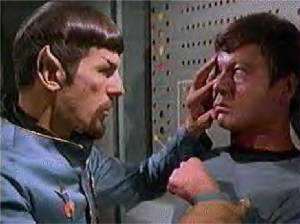
Near the end of the episode, when
Kirk was preparing to transport the rest of the landing party to their original universe, the MU Spock arrives in the nick
of time, holding up McCoy for support. When Scotty comes over, concern in his features, the MU Spock gently hands over McCoy’s
arm, speaking almost fondly, “Take him.”
However, the main gripe most coyotes have with
this episode is that McCoy, after suffering a horribly invasive mind touch, is seemingly himself without any residual damage.
Most of fanon disagrees with this and many stories have been devoted to how McCoy dealt with the suffering, and how it influenced
his relationship with his own Spock.
For two very different, and very interesting
takes on it, both by the same author, please see A Man of Integrity (http://hjc.akicif.net/AManofIntegrity.html) and Through a Mirror, Darkly (http://hjc.akicif.net/TAGDstorylist.html), both by Jane Carnall.
Episode #43 “Bread and Circuses”:
A disclaimer must be put on this episode, due
to the constant insults from Spock about McCoy’s medical competence. And this disclaimer is as follows: Doctor M’Benga
is a fully-competent surgeon. It is even established that he interned in a Vulcan ward, making him more than qualified to
handle Spock’s peculiar physiology. If Spock truly doubted McCoy’s ability as a physician, he would have long
since requested M’Benga to be his primary health provider. Yet, he did not. This proves, at the very least, that Spock’s
insults are not serious.
That having been addressed, Bread and Circuses is a rather complex episode for both the Spock/McCoy and the Spock-McCoy relationships. They
start out with rather light jibes at one another’s expense,
McCoy: Just once, I’d like to beam down on a planet and say “Behold,
I am the Arch-Angel Gabriel.”
Spock: I fail to see the humor in that situation, Doctor.
McCoy:
You could hardly claim to be an angel with those ears, Mister Spock. But suppose we landed some place with a pitchfork...
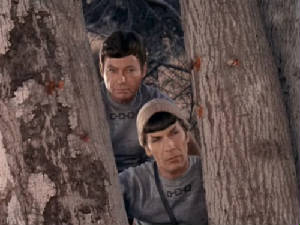
However, as the episode progresses,
the two begin to pick at one another in ways that lead observers to ponder if their relationship is one of friends or enemies.
This fighting leads to the point that during their battle with Flavius Maximus and the other gladiator, they continue to argue
with one another, and McCoy, as a result of the anger and irritation he is feeling, refuses to ask for help although he has long since fallen to his knees in a defensive position.
But despite what appears to have been the high point
of tension, and for the record, has not yet scratched the surface the tension between them, Spock notices the trouble that
McCoy’s in and breaks the rules of the battle. This is important, because he puts himself in direct risks, since the
rules state that a violation could lead to death, and his interference is a clear violation. Regardless of the risk, he steps
in to deliver a nerve pinch to Flavius, to keep McCoy from harm’s way.
Later on in the prison cell, McCoy needles Spock
to admit to his emotions, and he eventually descends up on him, touching him, although he’s well aware Vulcans hate
casual touch. Spock doesn’t ask him to stop.
McCoy: You wouldn’t know what to do with a genuine, warm, decent
feeling.
Spock: Really Doctor? (insert long pause)
McCoy:
I know. I’m worried about Jim, too.
And now to express an opinion with which many
people will disagree, as is their right. I submit that the above discussion had absolutely nothing to do with Jim Kirk. And
this is why:
The two of them, throughout this entire episode,
have demonstrated that neither has the ability to apologize to the other without making emotions rise even higher. However,
things have been said, hurt has been inflicted, and they need to find a way to express this without hitting nerves. The perfect
solution is to talk about their mutual friend, in danger, while allowing the conversation to have a second meaning.
And in fact, after this little discussion, the
two are on good terms for what remains of the episode. It’s simply something to consider.
Episode #44 “Journey to Babel”:
McCoy and Spock’s relationship is rather
sedate in this episode. The arguments occurred over the safety of Spock and his father, rather than their usual banter over
philosophy. As a matter of fact, when Spock reveals that Ambassador Sarek, who has been treating him poorly, is his father,
McCoy gets his defensive look and he puffs his chest out. The indignation on Spock’s behalf is clear in his face.
During
the diplomatic reception, McCoy takes painstaking steps to warm up to Spock’s parents, as well as to inquire about Spock’s
childhood. Although many people think this is an attempt to get dirt on Spock to use in arguments later, it’s something
much less sinister than that. McCoy’s been given the rare opportunity to learn more about Spock, who in I, Mudd (Episode #41), revealed he preferred to not discuss his past at all. Any person with feelings of affection
couldn’t possibly pass up this opportunity.
After it is
revealed that Sarek is in need of an operation and there’s not enough blood for the procedure, McCoy is exceedingly
concerned about Spock’s safety, to the point of nearly denying his father care for fear of harming Spock. He would prefer
to lose Sarek’s life than to put Spock’s life in jeopardy with the chance that he could lose them both.
At the end of the episode, Spock turns strangely
submissive with McCoy. When he tells him, quite exasperated, to “Shut Up!” Spock does nothing more than raise
an eyebrow, realizing that McCoy’s been through enough that day and doesn’t need any more on his plate. Were there
no affection between them, Spock would have responded immediately with a quip.
Episode #48 “The Immunity Syndrome”:
This episode pushes to the limits the relationship
between the two of them. Although on the surface, it’s a competition between Vulcans and humans, military duty and medical
science, who will win the right to get the information to the ship, it’s much more than that. Each is risking his own
life in order to save the other from a possible, and in the long run, should he fail, inevitable death. And the emotions they
demonstrate toward one another on this quest are impossible to ignore. This whole
paragraph has agreement problems.
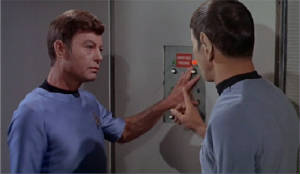
McCoy: You’re determined not to let me share in this, aren’t
you?
Spock: This is not a competition Doctor. Whether you understand it or
not, grant me my own form of dignity.
McCoy: Vulcan dignity? How do I grant you what I don’t understand?
Spock: Then employ one of your own superstitions. Wish me luck. (He pauses,
waiting for a response, and upon hearing none, closes his eyes in what could be construed as disappointment. He leaves and
McCoy hits the release on the shuttle bay doors. A look passed between them of strong emotion. And then he enters.)
McCoy: (Waits until Spock is completely out of earshot and the doors
are closed) Good luck, Spock.
The above exchange is indicative of their characters.
Although there’s obvious affection between the two of them, they still find it difficult to express verbally, and so
they find other means of making it clear to one another.
This exchange is continued when Spock is about
to lose contact with the ship. Spock chooses, as his epitaph, “Tell Doctor McCoy
he should have wished me luck.” It is somewhat interesting that as far as the audience and the crew is aware; Spock’s
last thoughts are of McCoy, and on a subject nobody but the two of them understand.
When they finally lose contact with the shuttlecraft,
the entire crew has come to the conclusion that Spock has died, and the ship must find an alternative means of saving themselves.
And despite this feeling of loss on behalf of the crew, it’s McCoy who refuses to accept his death.
Kirk: What’s on your mind?”
McCoy: Spock. (Pause) Is it me, Jim? Am I so sentimental that I just
have to keep believing that he’s still alive in that mass of protoplasm?
Kirk:
He knew the odds when he went out there, just as you did when you volunteered to go.
The above exchange demonstrates that everybody,
including Captain Kirk, have given up on the possibility of Spock still living, while it’s McCoy who still believes
he’s alive. The sentimentalism to which he refers could be construed to be a mind link of some sort that the two of
them share.
When they finally rescue Spock, McCoy and he
have had their final arguments of the day, McCoy earned himself a new nickname for the bedroom.
Episode
#49 “A Piece of the Action”:
“A
Piece of the Action is one I have on tape and is an excellent example. Throughout the story, when they are in the same area,
they are usually standing close enough to each other to be wearing the same underwear.” – TJ
A Piece
of the Action, is one of the subtler Spock/McCoy episodes, whose evidence lies mostly in their proximity to one another.
For most of the episode, they are seen beside one another in scene after scene, McCoy spends a large portion of their scenes
together staring at Spock’s ears. And their banter is on more sedate terms.
Spock: (Nerve pinching a radio monitor)
McCoy: (Watching carefully) You do that very well.
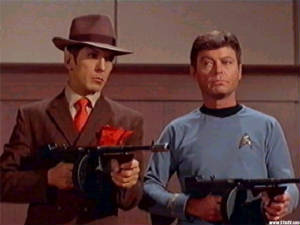
And finally, this episode is once more evidence that Spock’s best defense
lies in McCoy. For when Bela Oxmyx calls Spock a “dummy,” an extremely
indignant look comes over McCoy’s face, and his body assumes the puffed-up posture of an animal whose mate has just
been attacked.
Episode
#50 “By Any Other Name”:
In this episode, the two
of them are all over each other. Starting with the beginning when Spock’s thrown to the ground from his meld with Kelinda,
McCoy has his arm around him to steady him, while Kirk concentrates on things of a more command nature. McCoy keeps his arm
around Spock for a few minutes of screen time and when he finally lets go, they continue to stand beside each other. When
Spock forces himself into a trance to pretend to be ill, McCoy holds him and refuses to leave his side, part of the subterfuge
but part from genuine concern.
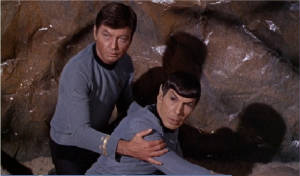
Afterward, McCoy lies about Spock’s
illness, claiming he has “Rigellian Casaba Fever” and needs injections of Stokaline (which is actually a vitamin
injection). It becomes apparent that Spock’s awake and fine, and McCoy’s left in charge of him, alone. Nobody
sees or hears from them for a while.
Later in the episode, while Kirk
is working to seduce Kelinda…
Spock: Doctor, I’m due for another injection of Stokaline.
McCoy: What?
Spock: (Tapping him) Stokaline.
McCoy:
Oh. (rises, turning to Kirk) You will excuse us.
The fact that the two are disappearing for a
period of time, under the pretenses of retrieving an injection for a disease that doesn’t exist, is evidence in and
of itself. The fact that Spock is engaging in casual touching to get his attention, when Vulcans do not engage in casual touching
outside of emergencies or with their spouses, is even more impressive.
Although they part, they arrive back at the recreation
room together, at the end of the episode and upon hearing the news that they are returning home, McCoy bounces [understood – no one bounces side-to-side] on the balls of his feet and jabs Spock gently in the
side. Spock reacts with a fond look.
Episode #58 “The Paradise Syndrome”:
This episode puts a lot of strain on their relationship,
beginning with everybody blaming Spock for the ship being crippled and the loss of Captain Kirk, with McCoy taking the lead.
But McCoy quickly learns the effect it had on Spock and spends a good portion of the rest of the episode trying to apologize
to him and get him to take better care of himself. It also proves that he has free run of Spock’s quarters. This is
peculiar for a Vulcan, who values privacy above all things, to let a man he didn’t care for to invade it whenever he
wished.
For a more emotional look at this scene, please
read Book Two of Lyrastar’s story The
Prayer of St. Francis which can be found here: http://www.geocities.com/lyrastarwatcher/prayerbook2.html
Episode #62 “Is There in Truth, No Beauty?”:
In [you use “during” in the very next sentence] this episode, Spock enters
into a mind meld with the Medusian Ambassador Kollos, which allows them to create a dual-entity. During this time, Kollos
is in control, mostly of Spock’s body, although his personality manages to shine through. He begins to look around the
bridge, identifying every person he can. He turns to Captain Kirk and says “James
Kirk, Captain and friend for many years.” But then he turns to McCoy, and says, “And
Leonard McCoy,” followed by deep, joyous laughter, “Also of long acquaintance.”
Although he does not elaborate further on the relationship, it is obvious that the memories he tapped were of great joy.
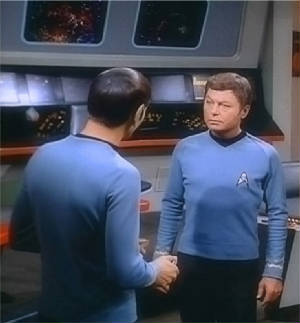
After the mind
link is broken and Spock has laid eyes on the Medusian Ambassador, he is knocked unconscious and brought to sickbay. While
he is in sickbay, McCoy is more than a little overprotective of him, acting as though he must single-handedly shield Spock
against any further damage. This extends to him giving Kirk a warning about not rocking the boat, with more animosity than
would normally exist in a conversation between the two.
Episode
#63 “The Empath”:
The Empath is one of the slashiest episodes ever
made in Star Trek: The Original Series, and has been used by all slashers of the Big Three in an attempt to prove their parings.
I’m not above doing this, why look a gift horse in the mouth?
What makes this episode particularly slashy is
a combination of the obvious hurt/comfort elements of the storyline, coupled with the no-holds-barred displays of affection
on behalf of the characters.
Although there are strong examples of friendship
throughout the entire episode, the very slashy bits begin with Kirk’s return from his torture and the revelation on
behalf of the Vians that they will need a second subject. There’s an 87% chance that McCoy will die in the process,
and although Spock won’t die, there’s a 93% chance that he’ll suffer brain damage that will result in a
permanent vegetative state.
Kirk’s unable to reach a decision, so McCoy
makes one for him, by injecting him with a sedative forcing him into a deep sleep. Spock commends McCoy for his actions, stating
that he has simplified the situation immensely.
Spock:
While the Captain sleeps, I am in command. When the Vians return, I will go with them.
McCoy can’t accept
these circumstances, so he, once more, takes matters into his own hands.
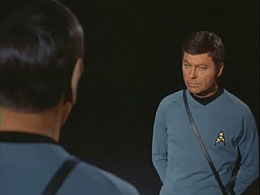
Spock:
(After McCoy injects him with a sedative) Your action is highly unethical. My decision stands.
What I want to know most of all is why it’s
unethical when McCoy does it to him but not when McCoy does it to Kirk? My leading theory is that whereas Kirk was their friend,
Captain, and a neutral party to their relationship, McCoy’s actions broke the rules of their general interaction, in
that they both try to save the other, for the life of the other is more precious than his own life, but to lie, cheat, or
trick damages the purity of the relationship, and to some degree, the trust. However, he certainly meant well.
This decision, of course, results in very severe
torture, and the Vians leave McCoy hanging on the chains of the chamber. Spock, having modified one of their transportation
devices to his own brain patterns, transports himself, Kirk, and the Empath Gem to the chamber where they release McCoy and
lay him down on the platform in an attempt to make him comfortable.
Spock takes it upon himself to examine McCoy,
reading off symptoms and his deteriorating status. When McCoy sits up and coughs, Spock grabs at his arm in an attempt to
steady him, to give him comfort. Kirk then pulls him aside and asks if McCoy will live. With the sorrow evident in his voice,
Spock informs him that he won’t.
Spock:
We can make him comfortable. That is all.
The next time McCoy regains consciousness; Spock
sits beside him, hovering over him. He takes both McCoy’s arm and his head into his hands to steady him, [and then he
holds his head in his hands] you just said this, and brushes his hair away from his face in a caress, before running his fingers
over McCoy’s temple. Although the audience isn’t quite certain what happens in that moment, McCoy’s eyes
go wide for a split second.
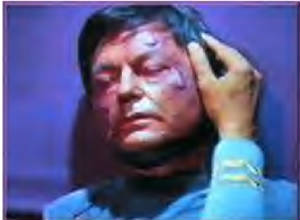
McCoy:
You’ve...you’ve got a good bedside manner, Spock.
In the next, McCoy lapses into unconsciousness,
and still Spock hovers over him. It’s only when Kirk calls him away that he leaves. And it’s Spock who comes up
with the idea of having the Vians cure McCoy.
Once more, in the name of love, Spock saves McCoy’s
life after McCoy had attempted, and succeeded, in saving his. This action took
place before. Not everything should be in the present tense, especially when
you’re describing things that have already occurred.
Episode #64 “The Tholian Web”:
Although this episode has a great deal of focus
on the friendship between Kirk, Spock, and McCoy, the episode does demonstrate that Spock and McCoy can survive without the
presence of Captain Kirk.
Although they spend the
beginning and most of the middle of the episode hip-deep in arguments and emotions, by the end of the episode, the two of
them have come to terms with their differences, and have worked toward a means of running the ship without their Captain.
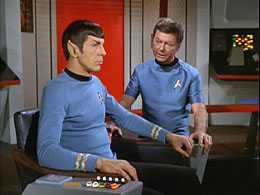
McCoy: (holding up his glass of Theragin derivative combined with alcohol
in a toast) Drink up Spock. It’s the human thing to do.. (A pause, as he notices Spock does nothing) That’s an
order. Captain. (A smile and a wink)
Spock:
(Nods and takes a sip from his glass)
Not only do they make an excellent team in this
story, finding a way to save the ship and their Captain, but it’s also the only episode in which Spock calls McCoy “Bones,”
which he does in answer to an apology offered up by the Doctor for insulting him. And they’re perfectly functional together.
Kirk: I trust there weren’t any problems.
Spock: None worth reporting, Captain.
Kirk: Try me.
Spock: Only such incidents that are bound to occur when humans are involved.
Kirk: Which humans, Mister Spock?
McCoy: (Jumping in and rubbing his arm against Spock) He means when humans
are involved with Vulcans.
Kirk:
Oh. (Smiling as he watches the two of them)
The question that comes to mind is “how
involved?”
Episode
#65 “For the World is Hollow and I Have Touched the Sky”:
Many people have difficulty seeing this episode
as S/Mc because McCoy doesn’t tell Spock about his affliction with xenopolycethemia. There’s a simple explanation
for this, which stems from McCoy’s past history revealed in the Star Trek V:
The Final Frontier. McCoy had to watch, helplessly, as his father’s condition slowly deteriorated from a terminal
illness. The memories of this event were no doubt burned into McCoy’s memory for all time, and the love he held for
Spock, within his own mind, could very well have forced him into the mindset that it’d be better to lie to Spock, to
avoid forcing him into that same situation. When Natira appeared, and he found an escape, he decided it would be better to
simply leave, inflicting temporary pain on Spock, rather than burning the same memories into his eidetic Vulcan memory for
eternity.
Furthermore, when McCoy awakens, he continues
with his charade, pretending that all is well, but when he realizes that Spock has reached out to steady him, and sees the
look on his face, one of sorrow and concern, but held together with Vulcan dignity, he trails off, dropping all pretenses.
It becomes clear he realized Spock knew before Kirk said so. And not wanting to dwell on the subject, he rises, forcing Spock’s
hand to fall free, and finds something rather innocuous to discuss instead. However, the emotions conveyed between the two
of them in that small amount of time is overpowering. Nice interpretation.
When McCoy calls for help, it is Spock who removes
the Instrument of Obedience from him, and it’s Spock who stays with him, watching over him with unusual attentiveness.
The concern he has over McCoy’s safety is quite apparent in this scene. He only leaves him on Kirk’s order.
Finally, Spock is the one who finds the cure
in the Fabrini records for xenopolycethemia, and decides to apply it to McCoy. McCoy has already decided to leave Natira,
citing a desire to spread humanitarianism to the galaxy in the year that he had left, and he returns to the ship. When he
learns that Spock has found the cure, he undergoes it willingly, and despite the fact that there is a competent medical staff
onboard, Spock finds it necessary to oversee the entire procedure. And although Kirk offers the option of visiting Natira
once they reach the Promised Home World, in canon, McCoy never does. He has obviously moved on.
Episode
#78 “All Our Yesterdays”:
This episode is another complex one for their
relationship, because of the presence of Zarabeth and Spock’s reaction to her. However, that’s easily explained
and despite her appearance, this is one of the, if not the, slashiest episodes in existence. While watching this episode for
quotes, I must have turned bright red from some of the dialogue. And on a note about the Sci-Fi Channel’s TOS Marathons:
They cut out all of the slashiest bits of this episode. So if you’ve only seen it in syndication, you ain’t seen
nothing yet.
It can be seen as somewhat metaphorical that
the two of them cannot go back through the Atavachron without one another. Although this is explained as the result of them
stepping through at the same moment, it can also be viewed as the fact that cosmically, they cannot be separated.
Once McCoy falls into the
snow, from the cold, their conversation deteriorates into an attempt by both to keep the other safe. McCoy encouraging Spock
to leave him in the snow, while Spock makes it clear that he’ll do no such thing.
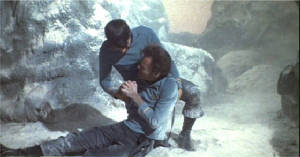
Spock: (Pulling McCoy into his arms) In this severe cold, we cannot survive
much longer.
McCoy: Leave me here, Spock.
Spock: We go together or not at all.
McCoy: Don’t be a fool. My hands and face are frostbitten. I can’t
feel my feet. Alone, you have a chance. Now do what I say. Go try to find Jim.
Spock:
(With determination) We go together.
After that exchange, during which Spock is holding
and touching McCoy for extended screen time, Spock takes it upon himself to half-lead, half-carry McCoy into the cave Zarabeth
shows him, and then, continuing to hold him, helps him onto a bed of furs, before tucking him in and sitting beside him to
scan his life signs. He goes so far as to check McCoy’s readings by hand, instead of simply with the machine.
At first, it must be noted, Spock is unaffected
by Zarabeth’s presence. He turns his attention from her and concentrates fully on McCoy. He continues to speak with
her because she refuses to stop asking questions of him. The only reason they touch initially is because she begins to panic,
assuming that she’s having a hallucination. He attempts to calm her, and when Spock realizes they’re touching,
he releases her immediately and reaches down to touch McCoy.
Each time that Spock examines McCoy, Spock initiates
physical contact with him, while ignoring Zarabeth’s presence. This pattern continues until Spock has become firmly
rooted in the feelings and behavior of his Ancestors. Each time McCoy regains consciousness, he speaks of their obligation
to find Captain Kirk. And at first, Spock seems to honor this request, making an attempt to go immediately to seek out the
portal. This is the only thing he asks of Zarabeth at this point, instructions on how to get there. But she overcomplicates
matters by bringing up how he can’t leave McCoy. Spock agrees with this, and this is when his primary turmoil begins.
When McCoy regains consciousness a second time,
Spock is still overprotective of him, ushering him towards the bed, where he then moves to tuck him in, and sits above him.
It is at this moment that things begin to change
within the Spock-McCoy relationship, due to the presence of Zarabeth. He expresses to McCoy that they’re trapped, and
although McCoy accepts this at face value for the time being, the revelation leads to some further complications McCoy refuses
to give up on the situation, but Spock, in his rapidly deteriorating mental condition, already had.
The third time McCoy awakens, he’s showing
a distinct improvement in his status. He’s eating food Zarabeth has cooked for him.
McCoy: Zarabeth, you’re a beautiful cook. Have you ever been told
that?
Zarabeth: Not recently.
McCoy: Well, you’ll learn that Spock’s quite delinquent in
those matters.
Zarabeth: I didn’t notice it.
McCoy: Oh? (long pause, as he looks up at Spock with a question in his
eyes)
McCoy: Well, now that I’m feeling better, you’ll notice a
distinct difference in our approach.
Spock:
(Deadpan) Really.
It’s impossible to get a true feel for
the above dialogue without seeing it for oneself. The looks exchanged between the two of them convey so much emotion that
even non-slashers of the ilk “Spock gay? No!” have commented on it.
What’s also important to note is the fact
that although both are somewhat flirting with Zarabeth in the above exchange, it’s very difficult to tell if the jealousy
they display is over her, or over each other. When later and earlier moments between them are taken into account, it becomes
evident that they’re jealous over each other.
What I find of particular interest in this episode
is the use, on the part of both Spock and McCoy, of plurals to describe one another. They have a tendency to speak on behalf
of one another. This can be construed a number of ways, and I’m interpreting it to mean that they’re linked, that
both are aware and that both approve.
After McCoy has attempted to goad Zarabeth into
admitting she lied, Spock defends her and backs McCoy into a wall. His hand is around his throat, but McCoy’s hands
are on his body, not struggling.
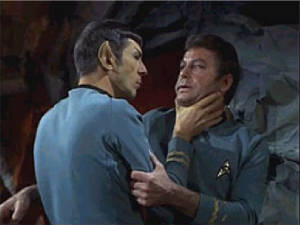
McCoy: Are you trying to kill me Spock? Is that what you really want?
Think. What are you feeling? Rage? Jealousy? Have you ever had those feelings before?
Spock: This is impossible. Impossible. I am a Vulcan (releasing McCoy.).
McCoy: The Vulcan you know won’t exist for 5,000 years. Think?
What’s happening on your planet right now.
Spock: My ancestors were barbarians. War-like barbarians.
McCoy: You’re reverting to your ancestors. 5,000 years before you
were born.
Spock:
I have lost myself. I do not know who I am.
After this exchange, Spock seems to have regained
a bit of his control and he asks Zarabeth if they can return.
Zarabeth: I do not know. I only know that I can’t go back.
McCoy: I’ve got to try. Because my life’s back there, and I want that life.
With that statement, McCoy leaves, and he clearly
offers Spock a choice. Spock can choose between him and Zarabeth. If he chooses to stay, he chooses her. But if he chooses
to follow, he chooses him. Although at first, Spock is set in his decision to stay with Zarabeth, when he learns that McCoy
will be unable to return without him, the decision is easily made. Despite the feelings he’d developed toward Zarabeth
in that environment, McCoy’s safety and well-being must always come first. And so he returned.
At the very end of the episode, McCoy watches
Spock cautiously, trying to come to terms with what occurred on Sarpeidon.
Spock: There is no further need to observe me, Doctor. As you can see,
I’ve returned to the present in every sense.
McCoy: But it did happen, Spock.
Spock:
Yes, it did happen. But that was 5,000 years ago. And she is dead now, dead and buried, long ago.
With that bit of wisdom, Spock conveys to McCoy
that although neither of them will forget the incident, they can move on from it, and McCoy has Spock to himself once more.
And that,
my fellow coyotes, is how you deal with the presence of a woman in the middle of a long-standing slash relationship.
We Meet Again (Star Trek: The Motion Picture):
This movie symbolizes a New Beginning, as well
as an end of sorts. It explains that after the Five Year Mission, Spock returned to Vulcan to study Kohlinahr, the Vulcan
discipline of the elimination of all emotions at the Temple of Gol.
This process is extremely difficult although exact details are not explained in the movie, it seems to be a life-altering
decision. McCoy, likewise, also retired from Starfleet, but he instead grew a beard and found something he enjoyed a lot more
than taking orders from brass with superiority complexes and dealing with crewmembers with death wishes.
McCoy’s presence onboard the Enterprise is quite logical. He was forcibly reinstated, and he’s
none too happy about being onboard the ship after its upgrade, and he’s especially unhappy about having to learn his
way around the new sickbay.
Spock, however, has a somewhat more ambiguous
entry into the mission. His scenes open with him at Gol, preparing to be given his symbol of the achievement of true and total
logic. He stares up at the Sun and just as he is about to be adorned, he holds his hand up to delay the ceremony. The High
Priestess demands to have his thoughts, and upon accessing them, decides to cast him away.
Priestess:
I sense the consciousness calling to you from space. Your human blood is touched by it, Spock. You have not yet attained Kohlinahr.
(Turns to the other Priests) He must search elsewhere for his answer. He shall not find it here.
This is a rather nebulous statement, and although
most Star Trek fans have interpreted it to mean that V’Ger was calling to him, since they were both trying to find answers
to questions larger than themselves, this is not truly established. And in slash, the writers tend to interpret it to mean
that Spock felt his place in the universe, with his beloved, in this instance, McCoy.
Further evidence of McCoy’s knowledge of
Spock’s personal choices occurred when Spock arrived on the ship and somewhat prior. McCoy was quite aware that Spock
went to Gol and exactly what it was he had been doing there. It was McCoy who was most upset about Spock’s choice to
depart from Starfleet, and it was McCoy who left Starfleet right after Spock did, implying that without him, he had no reason
to remain.
When Spock finally arrives on the Enterprise to assist with the mission and offer his services as the science
officer, it’s McCoy who’s most surprised and delighted, despite the hurt he radiates over Spock’s departure
in the first place.
McCoy:
(Upon seeing Spock for the first time in 18 months) So help me, I’m actually pleased to see you!
Later in the movie, during an interview, McCoy
begins to peck at Spock not as a means of insulting him, but in an attempt to simply make him emote, since before that interview,
he’s been completely expressionless.
McCoy: We’ve already guessed why you’re here-
Spock: (A flicker of emotion in his features)
McCoy: That flicker of emotion confirms our guess. You failed.
Spock: Your deductions do you credit Doctor...if your puerile curiosity
does not.
McCoy: (Not in amusement) And now anger
Mister Spock?
Spock:
(Pause, nods) I still contain fragments of my human half.
The moral of that particular exchange is that
old habits die hard, and McCoy, not knowing how else to get Spock to respond, picks an argument. Throughout the movie, the
two of them are able to work together, and with Kirk, in order to find an answer to the V’Ger mystery. After Spock’s
fiasco of an attempted meld with V’Ger, it’s clear he’s regained some sense of his emotions. And it’s
this revelation that leads to his later decision to remain with the Enterprise.
At the end of the movie, once all has been said
and done, Spock has made it clear he has no desire to return to Vulcan and in one of the greatest of all nitpicking moments,
there’s a scene when Spock and McCoy are on the bridge wearing one another’s uniforms. Spock has medical orange
and McCoy science green. But a few minutes later, it’s the reverse.
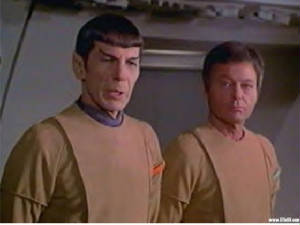
A very slashy explanation for this SNAFU can be found in Bait n’ Switch (http://www.geocities.com/lyrastarwatcher/bait.html) by Lyrastar
With the end of the movie, Spock and McCoy are
once again arguing about poetry:
Spock:
I prefer your poet Dante’s phrase – “the divine restlessness of the human spirit.”
McCoy:
Spock...you’re quoting poetry?
Spock:
(About to respond but cut off by Uhura)
And the audience, slashers especially, know that
all is right with the universe. After this movie, Spock and McCoy are united and there are approximately fourteen years of
missing slash between this movie and its first sequel.
Alternatives:
The Motion Picture is a fluctuation in the timeline.
There are three ways of handling Spock’s departure to Gol in The Motion Picture in regards to an S/Mc relationship.
1)
To have Spock and McCoy get together only after his return from Gol. The possibilities within this are numerous.
Spock left because of sexual tension or a fear of never being able to engage in a relationship. Now that he’s back,
they can take the inevitable step. Or in that long stretch of time between the first and second movie, Spock and McCoy manage
to enter into a relationship.
2)
To have them in a relationship prior to his departure to Gol which resulted in the predictable hurt on McCoy’s
part and the strain in their relationship which is apparent in the movie. After his return from Gol, it takes a while for
the two of them to work around the hurt that was presented by his departure, but they find a way to make it work.
3)
To ignore it completely. There are plenty of Alternative Universes (AU) that have been established that follow
canon completely but for Spock’s departure to Gol, because sometimes it’s just not that simple to work out.
There is one possibility
ignored in this, and this is the S/Mc relationship existing prior to the departure from Gol which is not reestablished afterward.
There is one S/Mc of which I know takes this tactic: After the Rescue (http://www.trekiverse.org/startrek/startrek/adult/tos/AfterTheRescue) by Karmen Ghia. The reason I don’t
go into detail about this fourth possibility is because it’s much more depressing than the other three, and on the whole,
much less fun in a coyote sort of way.
When McCoy Met the Katra (Star Trek: II, III and IV):
Although there’s
a degree of slashy interaction between Spock and McCoy in the beginning and body of Star Trek II: The Wrath of Khan, this
part of the essay will focus on the most pertinent interactions for their relationship, in this case, the few minutes before
Spock’s death scene.
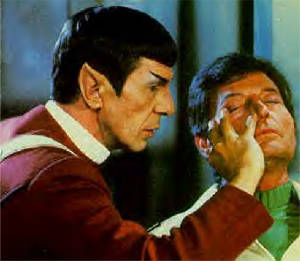
“Remember.”
Perhaps the strongest evidence canonically for
Spock/McCoy lies in Spock’s decision to leave his katra to Doctor McCoy before his death in Star Trek II: The Wrath of Khan. In the twenty-two and a half years since this movie first hit theatres, countless
theories of Spock’s reasoning have been pondered by Trekkie and slasher alike. And as a result of this speculation,
the following can be noted from the action:
1)
McCoy was obviously more suitable as the Keeper of the Katra, because Spock had the option of leaving his katra
with Scotty, who was unconscious already, but chose McCoy instead.
2)
Spock realized the situation while on the bridge and knew at that
moment that he would die. Since he is able to leave his katra with a person and still function for a period without it, he
could have found a way to leave it to Kirk or Saavik, but waited until he was with McCoy to make the transfer.
3)
Saying “Remember” seems rather simple for transferring one’s entire essence into the mind
of another person, unless one was very familiar with the mind of that person.
Regarding Spock’s death
scene, over the years, many non-coyotes have brought up his touching farewell to Captain Kirk, his “you have been, and
always shall be, my friend,” speech. There was no similar farewell to McCoy. The only proper response to this is that
he left McCoy his katra. What better farewell could he give than the essence of his being?
At the funeral, although Kirk is delivering the eulogy, McCoy, too, is holding back
tears. And of everybody at the funeral, he’s acting the strangest, unbeknownst to the crew at the time, because he’s
attempting to reconcile the fact that Spock died with the feeling that Spock is still with him.
Although the interlude between the Star Trek II: The Wrath of Khan and Star Trek
III: The Search for Spock is not very long, a lot occurs in it. Most noticeably, the beginning of McCoy’s descent into
“madness,” when Spock’s katra begins to exert control over McCoy’s body. – this is a fragment.
A great explanation of how this begins is in Voice
(http://cosmicduckling.com/amphi-voice.html) by Amphioxous Obnoxious
From the minute Kirk realizes that it’s McCoy who has broken into Spock’s quarters, things begin to make
some sense. He doesn’t inquire into why McCoy’s in Spock’s quarters; it’s almost as though he expected
such an attempt. He only begins to grow concerned when he realized McCoy was speaking about Vulcan, in a voice rough, similar
to Spock’s.
When the rest of the crew learns of McCoy’s
breakdown, nobody seems surprised, although all are a bit overprotective. At the gathering for the dry docking of the Enterprise,
the crew makes a last attempt at jocularity. Unfortunately, the conversation turns sour, since the occasion is so somber.
Uhura: How is Doctor McCoy, Sir?
Kirk:
That’s the good news. He’s home, in bed, full of tranquilizers, and he promised me he’d stay there...They
say it’s exhaustion...we’ll see.
This contemplation on McCoy is interrupted by
the entrance of Sarek, who assumes that Kirk is the Keeper of Spock’s katra, because he was the last one to be with
him. When he learns this is untrue, he and Kirk search through the computer’s records in order to determine with whom
Spock might have left the katra. Neither of them was aware at the time that McCoy had been in the engine room when Spock had
entered. After some extensive review, they learn that it’s McCoy who holds it. And despite what would seem like a somewhat
shocking revelation, neither of them is particularly surprised with this. It can be construed that McCoy, for personal reasons
both of them knew, was the most logical choice, as discussed earlier.
Meanwhile, McCoy has been attempting to sneak
back to Genesis and has managed to get himself committed. Kirk and the rest of the crew realize this and conceive of the greatest
jail break in Star Trek history. When Kirk enters under the guise of a friendly visit, he refers to McCoy as “Fruity
as a nut cake.” Now I don’t know what part of Iowa Kirk came from, but in most places “fruity” means
gay. And considering how the colloquialisms of the 23rd Century seem quite similar to those of the 20th
Century, there is a very large possibility that it means the same then. Besides, Nut cakes do not contain fruit.
Kirk: (Hand in the Vulcan salute) How many fingers am I holding up?
McCoy: That’s not very damned funny.
Kirk: Good. At least your sense of humor’s returned.
McCoy: The Hell it has.
Kirk takes out a hypospray
McCoy: What’s that?
Kirk: Lexorin
McCoy: Lexorin? What for?
Kirk: You’re suffering from a Vulcan mind meld Doctor.
McCoy: Spock!
Kirk: That’s right.
McCoy:
(Without real anger) That green-blooded son of a bitch! It’s his revenge for all those arguments he lost.
What’s most important to note in the above
exchange is that although McCoy makes the comment, there’s a lack of real surprise on his part that Spock might have
done such a thing prior to dying. This implies that McCoy was either aware of the Vulcan ritual of carrying the katra, or
that Spock would have had personal reason to meld with him once last time before death. Either explanation indicates a rather
intimate personal relationship. The question arises of why McCoy did not know. There are a number of explanations for this:
McCoy expected to feel differently and when he experienced what he did instead, he was unable to place it; McCoy thought that
Spock would have warned him before doing it, and as no warning came, assumed the action had not taken place; or, possibly,
he did realize on some level what was occurring but the shifts of dominance between his mind and Spock’s katra made
it difficult for him to express to others.
The movie continues on a rather exciting course,
with McCoy passing in and out of consciousness, sometimes his, sometimes Spock’s. It’s when they arrive on Genesis,
after blowing up the Enterprise, find Saavik and Spock’s
body, and the recently murdered body of David Marcus, that the intimate moments increase ten-fold. They take the Klingon ship
by force, and place Spock’s body in sickbay, where McCoy watches over him. Alone in the strange sickbay, with only the
two of them, McCoy finds a way to express pure emotion without the guise of their jibes.
“Spock for God’s sake talk to me. You stuck this damned thing
in my head. Remember? Remember? Now tell me what to do with it. Help me.” Long pause.
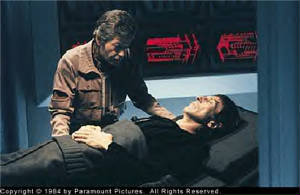
“I'm
going to tell you something that I... I never thought I'd hear myself say...But it seems I've missed you. I don't know if
I could stand to lose you again." – Doctor McCoy to Spock in Star Trek III: The Search for Spock.
When they arrive on the planet, T’Lar explains
the danger involved in the fal-tor-pan, the attempt to take Spock’s katra from McCoy’s mind and place it back
in Spock’s newly regenerated body. Given the choice between risking his life and leaving Spock a vegetable, McCoy makes
the only possible decision.
“I
choose the danger.”
In the next scene, McCoy goes through the fal-tor-pan
with Spock, an intensely intimate sharing of their full minds and memories, as is bound to occur when removing one man’s
mind from another’s, especially when the blending that occurred between the two of them “the scramble” as
McCoy called it, is taken into consideration. When the sharing is over, it leaves behind a resonance between them.
At the very end of the movie, Spock comes upon
the crew and reviews them one by one. He turns to Kirk, recognizing him from something his father told him. And when his memories
of the last few minutes before his death come back, he turns around to McCoy, glancing at him for reassurance.
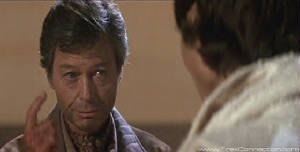
McCoy simply taps his temple, letting Spock know he’s with him always.
With this knowledge, Spock’s able to face the rest of the crew, and his personality begins to return.
In the final part of this trilogy of helping
Spock recover his memories; his relationship with McCoy comes through very strongly. It becomes evident early on in Star Trek
IV: The Voyage Home that McCoy desires to recover his former intimacy with Spock, but he’s not going to push.
It begins with Spock’s decision to accompany
the crew back to Earth. While he sits at the panel, McCoy comes over to him.
McCoy: Hi...busy?
Spock: Uhura is busy. I am monitoring.
McCoy: Hmm...Well, I just wanted to say – nice to have your katra
back in your head and not in mine. (Smiles)
Spock simply stares at him.
McCoy: What I mean is, I may have carried your soul, but I sure couldn’t
fill your shoes.
Spock: ...My shoes?
McCoy: Forget it. (Tries something else) Perhaps we could cover a little
philosophical ground? Life...death...life, things of that nature?
Spock: I did not have time on Vulcan to review the Philosophical disciplines.
McCoy: Come on, Spock. It’s me, McCoy! You really have gone where
no man has gone before. Can’t you tell me what it felt like?
Spock: It would be impossible to discuss the subject
without a common frame of reference.
McCoy: You’re joking!
Spock: A joke is a story with a humorous climax.
McCoy: You mean I have to die to discuss your insights on death?
Spock: Forgive me, Doctor, I’m receiving numerous distress calls.
McCoy:
(Frustrated) I don’t doubt it.
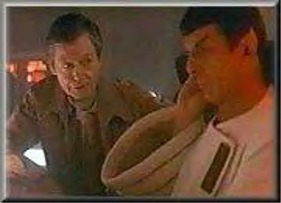
The above conversation has multiple
facets of a relationship between the two, mostly on McCoy’s part. When he states, “It’s me, McCoy!”
it implies that previously, they would have had such intimate conversations. Furthermore, the shy attempts at conversation
from McCoy indicate that he’s uncertain where they stand, and although he’s hopeful, he doesn’t want to
coerce. When he realizes Spock’s completely clueless, he can’t help but be flustered and he gives up. For the
time being.
When Spock creates his theory on the strange
transmission and leaves, McCoy demonstrates his protectiveness.
Kirk: (Following Spock) Bones, stay here.
McCoy:
No way. Somebody’s got to keep an eye on him!
This statement on McCoy’s part is one of
peculiar devotion. Kirk is, of course, going with Spock, but McCoy is reluctant to let Spock out of his sight, most likely
a combination of their newfound resonance from the fal-tor-pan and the feelings he held for Spock before.
When Kirk points out, quite logically, that nobody
in the twentieth century had seen an extra-terrestrial before, in a hint for Spock to cover his ears, Spock rips off part
of his robe and constructs a headband that covers his ear tips and makes him look like a wandering karate master. Instead
of looking to Kirk for approval, the man who suggested it, he instead looks at McCoy, who simply smiles at him and rolls his
eyes. Once more, a demonstration of the dependence Spock has on him.
As the movie continues, Spock spends most of
it on the wrong side of confused, and much of crew is somewhat afraid to approach him. They feel somewhat uneasy, at the very
least. Even Kirk spends most of his interaction time with Spock bemoaning how different he has become since the fal-tor-pan.
But Spock and McCoy continue on the new relationship
they have. When it becomes time for them to plot their course back to the future, Spock uses McCoy as his sounding board –
same idea.
Spock: Mister Scott cannot give me exact figures, Admiral. So I will...make
a guess.
Kirk: You? Spock, that’s incredible.
Spock: (To McCoy) I don’t think he understands...
McCoy: No, Spock. It means he feels safer with one of your “guesses”
than he would with most other people’s facts.
Spock: You’re saying...it is a compliment?
McCoy: It is.
Spock:
I will try to make the best guess I can.
When Spock is uncertain, he relies on McCoy for
help and guidance. It is clear that he depends now on McCoy for understanding, and the trust between them is very great indeed.
At the end of the movie, Spock takes his place
beside his crewmates to stand court-martial, and it implies that he has regained his memories, and he is once again whole.
This means that the Spock/McCoy relationship can continue as planned.
For a good interpretation on the court-martial
and afterwards, please read Return to Us (http://ainzfern.com/stories/SMCreturntous.htm) by Ainzfern.
Alternatives:
The fal-tor-pan provides a unique moment in Spock/McCoy
history for a new relationship to exist, one which might be more natural than any prior. Many S/Mc stories have been written
about them getting together as a result of the fal-tor-pan, with no previous sexual relationship. If any moment works best
for the establishment of an S/Mc relationship, it is this moment.
They find a new insight into one another, a new
dependence, and a new connection. And this is why no matter when the relationship first existed, before or after the fal-tor-pan,
it’s changed because of it.
1)
Should an author choose the route of having them establish a relationship as a result of the fal-tor-pan, it’s
easy enough. For the first time in their lives, they find their minds linked, both with telepathic resonance and the knowledge
that for that period of time, each was the single-most important person in the other’s life. A relationship could occur,
in the form of hurt/comfort, as Spock attempts to regain his memory and as McCoy attempts to regain sense of himself. It is
quite likely that this can only occur in one another’s arms.
2)
Should an author choose the route of having them resume a previously established relationship, there are certain
elements that can’t be ignored, such as Spock’s rash decision to forfeit his life without warning McCoy, and the
sacrifice to return his katra to his body. Another is the effect of it on McCoy’s mind. Hurt/comfort would exist in
this relationship too, but the focus generally falls on Spock’s regaining memories in order to soothe the pain inflicted
upon McCoy. However, once they’re together again, their bond is generally seen as stronger than ever.
3)
They get together either as a continuation of a former relationship, or a result of the fal-tor-pan, but it
doesn’t occur until Star Trek V: The Final Frontier or even later. There
are some indications that it is canonically what happened, especially for the establishment of a new relationship. This delay
allows for some interesting insights into character.
4)
Unlike the separation presented in Star Trek: The Motion Picture,
there’s really no way to ignore this event in their lives without a massive AU. The most common variation on the AU
theme with the fal-tor-pan is that Spock stays dead. But this isn’t an easy look at the relationship, nor a genuinely
uplifting one.
As far as I know, there are
no Spock/McCoy stories wherein they are in a relationship before his death and afterward their relationship comes to an end.
This could be a very depressing theme, but it could also be an interesting take.
Now That We’re Canonically Linked (Star Trek V and VI):
At the end of Star Trek IV: The Voyage Home by Vonda McIntyre, (the novelization of the movie), it’s explained that Spock
and McCoy share a lingering resonance from the fal-tor-pan, which try as they might, they are incapable of severing. Spock
states that he does not regret this resonance, and McCoy admits that he doesn’t either. I’d give specific quotes,
but I have long since lost the book and I’m running off memory, here. But if we take the above as a true statement,
this means that in the last of the Original Series crew movies, Star Trek V: The Final Frontier and Star Trek VI: The Undiscovered
Country, Spock and McCoy are linked in canon. This will be assumed for the remainder of this section and the next as well.
Although Star
Trek V: The Final Frontier takes place some months after the fal-tor-pan, Spock still hasn’t completely regained
himself. This allows for interesting interaction between the Spock and McCoy, including their peculiar new relationship and
the possibility that Spock hasn’t yet recovered all of his memories.
McCoy: (On the subject of Row, Row, Row Your Boat) It’s a song
you green-blooded Vulcan. You sing it. The words aren’t important. What’s important is that you have a good time
doing it.
Spock: (Sincere) I am sorry, Doctor. (Pause) Were we having a good time?
McCoy:
(Sighing) I liked him better before he died.
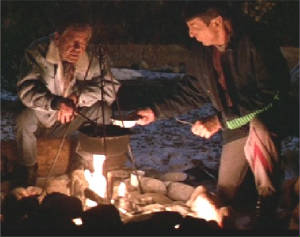
The implication in the above exchange
is that McCoy has a personal reason for wanting Spock back the way he used to be, and this is often interpreted, among coyotes,
to mean that Spock has not yet recovered his past memories of their relationship. And McCoy is growing a little tired of waiting.
For another interpretation on the above scene, please read Perchance to
Dream (http://www.geocities.com/lyrastarwatcher/perchance.html) by Lyrastar.
McCoy’s protectiveness of Spock continues
in this movie. When Kirk, Spock, and McCoy are tossed into the brig by Sybok,
and Kirk begins to yell at Spock for not having informed him that he had a brother, McCoy comes immediately to his defense,
forcing Kirk to calm himself. McCoy’s own reaction to the revelation is much more sedate.
McCoy: Spock, you never cease to amaze me.
Spock:
Nor I, myself, Doctor.
The protectiveness becomes a running theme. When
Spock and Kirk attempt to break from the brig, only for Kirk to be shocked from the security measures, he immediately begins
blaming Spock for not having warned him. And McCoy jumps to Spock’s defense, informing Kirk that, in fact, Spock had
warned him and Kirk just hadn’t bothered to listen.
The movie, however, reaches an emotional crux
when Sybok forces McCoy to relive the experience of having broken the Hippocratic Oath for his father by performing euthanasia,
only for a cure for the disease to be discovered two weeks later. When he takes away McCoy’s pain, he gains McCoy’s
trust. When he shows Spock’s pain as well, he assumes he now has Spock’s trust. But when he turns to leave, McCoy
goes to follow him, but Spock does not.
Spock: I cannot go with you.
Sybok: I do not understand.
Spock:
You are my brother, but you do not know me. I am not the outcast boy you left behind. Since that time, I have found my place
in the universe...here...among these people...my shipmates. My place is on the Enterprise.
McCoy:
(A pause as he’s obviously responding to Spock’s determination: I guess you’d better count me out too.
It’s apparent that McCoy draws his strength
from Spock. His ability to resist Sybok lies solely within the strength he finds in Spock, and that he only turns his back
on Sybok because Spock won’t go, and he won’t leave without him. This tie between them is most apparent at this
point in time in the movie, but it exists throughout their relationship, the reluctance to leave one another behind.
For a more in-depth look at this particular exchange
and how it affected the Spock/McCoy relationship, please read Possession is Nine Tenths...
(http://www.ainzfern.com/stories/SMCpossessionisninetenths.htm) by Ainzfern.
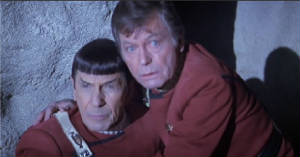
Another important emotional event in this movie is that only when
the fantastic energy being strikes Spock down does McCoy question its divinity. When Spock was hurt for asking, “What
does God need with a Starship?” does McCoy realize that this couldn’t be God, because no divine being would inflict
pain on its children for non-belief. And it is at this moment that McCoy risks his own life to question the being as well.
This movie also includes the end of a journey
for Spock and McCoy. At the reception held onboard the Enterprise in honor of the success of their mission, McCoy
and Spock are standing in a corner of the observation deck, having a philosophical discussion about life…death...life.
Things of that nature. The fact that Spock and McCoy are now able to have this discussion symbolizes that their lives, and
their relationship, has come full circle from the damage that occurred when Spock sacrificed his life.
One last thing to note about this movie: Although
McCoy does not generally engage in stereotypically gay behavior, in this episode he wears the single most flamboyant outfit
known to the entirety of the Star Trek Timeline. And he wears it off duty, on shore leave, implying that this was his own
choice. It’s just something to think about:

Star Trek VI: The Undiscovered Country takes place six to seven years after the end of the mission in Star Trek V: The Final Frontier. This is plenty of time in which Spock and McCoy could have reestablished their
former relationship or started a new one, and so the assumption is made that by this point in the timeline, they have already
entered into a relationship, and that it is long-standing.
The most noticeable aspect of the Spock/McCoy
relationship in this movie is that it is calmer, more sedate, than at any other period in the Star Trek timeline. For the
most part, their arguments have stopped, and what little remains is tainted so much by obvious affection that the words are
meaningless.
From the moment that Kirk and McCoy are arrested
for, and convicted of, the assassination of the Klingon Chancellor Gorkon, Spock slips into his most protective mindset. He
works to organize a means of rescuing them, and is willing to lie to Head Quarters on multiple occasions in order to do so
successfully.
The question of why Kirk was aware of the Verillium
Patch and McCoy was not is somewhat simple to explain. If the Klingons were aware that Spock and McCoy were in a relationship,
and any race worthy of being an enemy of the Federation would know that Vulcans enter into telepathic bonds with their mates.
If they so much as suspected that McCoy had knowledge of an escape plan, the Klingons, inventor of the mind-sifter, would
have had no qualms subjecting him to torture and questioning in order to learn of the plot, knowing that the Federation and
Starfleet had agreed not to interfere in any of the proceedings. The only way to protect McCoy would be to pull an Episode #59: The Enterprise Incident on him, keeping him out of the loop for his own protection. And McCoy
evidently realized this, for when he lay dying in the snow, asking Kirk to leave him, and Kirk revealed the existence of the
Verillium Patch, the best insult that McCoy can muster is, “That cunning little
Vulcan.”
Furthermore, when Kirk and McCoy arrive on Rura
Penthe, they immediately move in different directions. Kirk is active, he’s networking, and he’s attempting to
create an escape plan. McCoy, on the other hand, unaware of the possibility of being rescued, draws himself inward, concerned
about the fact that he’s going to die on a Klingon frozen prison planet, without ever seeing Spock again.
For a very detailed explanation of McCoy’s
thoughts during his dealings with the Klingons, please read In Medias Res (http://spockandmccoy.tripod.com/inmediasres) by T’Bitch.
The highest point of emotional display between
Spock and McCoy occurs on the bridge, when Spock is in the process of questioning Valeris about the conspiracy. When she refuses
to divulge any more information, Spock crosses the bridge, intent on entering into a forced mind meld in order to retrieve
the necessary information. But before he crosses, he meets McCoy‘s eyes with and a look is exchanged between them.
During the forced meld, while most of the crew
is fascinated by what is happening, and then later somewhat aghast, McCoy refuses to watch the violation at all, keeping his
eyes carefully averted. This is due to the fact that McCoy has his own demons regarding the violation he endured at the hands
of the MU Spock, so many years before.
When Spock has extracted the necessary information,
he crosses the bridge again, and once more, their eyes meet. A message is exchanged this time, and Spock’s glance implies
something along the lines of, “I would not violate you in such a way, and I know of your own aversion to the topic,
but the circumstances are dire, and I know you will forgive me.” Which, of course, McCoy does, although the entire process
has done little to set him at ease.
The most touching part of their adventure occurs
once possible countermeasures to stop the Klingon ship are revealed, and the two depart on their mechanical endeavor.
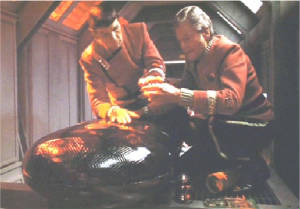
Spock: Doctor, would you care to assist me in performing surgery on a
torpedo?
McCoy: (Smiling) Fascinating.
The above exchange, followed by their joint attempt,
is quite interesting, considering the circumstances. McCoy is not good with non-scientific, tool-oriented tasks. He has stated
this many times. I’m a doctor, not a mechanic. I’m a doctor, not an engineer.
I’m not a mechanic; I couldn’t get that thing to work no matter how many notes you left. And Spock is undoubtedly
aware of this fact. This means that his motivation was emotional when requesting McCoy’s presence. And although it was
emotional, it was also flawlessly logical.
The Enterprise is attempting to stop an assassination attempt
that will lead to violent wars erupting all over the known galaxy between two major powers. The only way to possibly prevent
this is to defeat the guard ship, which is an invisible enemy, the likes of which had never been encountered before because
the ship can fire while cloaked. The two of them must design a heat-seeking torpedo and launch it successfully before the
ship destroys the Enterprise and everyone aboard. These circumstances
are hardly conducive to performance.
However, two options are presented to them. Should
they succeed, they have the knowledge of joint success, and they live to see another day in one another’s company. But
should they fail, with whom else would it be fitting for them to die? It especially
must be considered that less than one day before, the chances of them ever seeing each other again were slim, and each worried
about himself and the other dying, alone.
You mix future condition and present throughout
this paragraph. Fortune would have it that the two of them would be successful
in their endeavor, that the Enterprise would be overall successful and all would be pardoned of charges due to the nature
of the conspiracy. And with these under their belts, coupled with the knowledge that they saved the galaxy one last time,
the intrepid crew of the Enterprise can fly off to the second star to the right and
straight on til morning, while ignoring Head Quarters’ request, on Spock’s suggestion, and spend the three
months between the end of the mission and their scheduled retirement doing whatever it is they wish. This is, of course, the
happy ending for which everybody has been waiting.
This movie signifies a possible S/Mc relationship
spanning some 29 years, an incredible feat, since they’re still young. Spock is only 63 years old and McCoy only 66.
They have a lot of years ahead.
I hate to use cut scenes from the scripts in
this essay, however, this tidbit was too good to pass up. This is indicative of a late-blooming S/Mc relationship:
McCoy: Pity they’re retiring us just as I was starting to understand
you, Spock.
Spock:
We were beginning to hit our stride together, Doctor.
This dialogue suggests that Spock and McCoy have
finally entered into an intimate relationship. It is unfortunate it was cut, because of how suggestive it is. Then again,
it might have been cut because is does imply that they just recently entered into their more intimate relationship. Perhaps
the writers and director wanted everybody to know that they’d long since made that leap from friends to mates.
And After the Timeline?:
Star Trek:
Generations takes place approximately one year after the crew of the Enterprise
has retired. With Kirk’s apparent death, this movie marks the end of the era of the original crew. Please note both
Spock and McCoy’s strange absences from the launching ceremony.
However, Spock and McCoy can’t be dismissed
so easily. McCoy lives to be at least 134, since he was the supervising Admiral at the launch of the Enterprise-D. And despite
his severe age, he’s as feisty as ever.
Spock, too, lives much longer than the timeline
generally shows. He lives into at the very least his mid 130s, since he meets up with the crew of the Enterprise-D while attempting
to unify Vulcan and Romulus into lasting peace.
But how does this work? The question arose on
the Spock/McCoy slash list recently: how could they have a relationship if Spock’s on Romulus and McCoy’s in Starfleet. And the best suggestion I have to answer this question
is to read Breaking Point (http://www.members.tripod.com/spockmccoyote/breakingpoint) by Kelthammer. She manages to put
this all into perspective.
The fact is that some seventy years pass between
the last mission of the original Enterprise crew and Spock’s canonical appearance on
Romulus as a Peacemaker. There’s plenty of time for
he and McCoy to have been as freely intimate as they desire without worrying about repercussions.
And it’s logical, in a way. Spock/McCoy
is all about stability, and a stable relationship can overcome a long-distance. They can write and call one another. And with
McCoy as an Admiral, and with his history, he has considerable influence, and he would no doubt be capable of transporting
Spock to and from his hideaway so that they could enjoy elongated visits.
And since no actual date or type of death is
provided for either Spock or McCoy, one can believe, if one so chooses, that they’re even alive in Voyager’s timeline,
still together, still stable, still linked, and very much in love.
Spock/McCoy Fetishism:
Although this
is probably not a topic of interest amongst most coyotes, when writing a series called “Robotica,” and while reviewing
the episodes as fodder for this series, I managed to convince myself that Doctor McCoy has a robot fetish, henceforth referred
to as techno-sexuality. The series can be found on my personal story page at https://tempestcoyote.tripod.com/id1.html, but below is what I feel are milestones for this personal belief.
To summarize the Spock/McCoy Robotica timeline:
It begins with Spock and McCoy engage in another argument, which Spock wins. However, his assumptions were incorrect and he
becomes injured. While in sickbay, they apologize to one another for their harsh words and agree to meet in McCoy’s
quarters for an evening date. As a side not, this takes place somewhere in the late first season or the early second season.
When Spock shows up early in McCoy’s quarters, he attempts to do McCoy a favor by cleaning his room. This goes well
until he stumbles upon McCoy’s personal pornography collection and after an attempt to satisfy his curiosity, watches
and is thoroughly confused and somewhat concerned. McCoy’s pornography all contains sexual activity with androids and
other forms of robotics. At that instant, Spock realizes just why it is McCoy constantly refers to him as a computer, or compares
him to a machine. It was not an insult, but an attempt to combine his love and his fetish.
This is simply my opinion of the entire matter,
but it’s entirely fitting, because McCoy makes such references fairly often, more times than I can count, and it would
also explain why he dislikes technology taking over his everyday life. A fetish is a fetish. It’s fit for the bedroom,
but it’s not supposed to take over one’s life.
And now to see how canon falls into this peculiar
belief of mine.
Episode #37: The Changeling:
This episode is included in this section for
one reason, and one reason only. During the events of the mission to contain Nomad, it becomes necessary to extract information
from him. Unable to do so by conventional means, Spock enters into a Vulcan mind meld with him. And so for the amount of time
wherein Spock is linked mentally to Nomad, he has the mind of a robot. And when this entry is made into Spock’s log,
or better still, when Spock appears in sickbay to be treated for it, he will have made McCoy’s next several nights ripe
for fantasy.
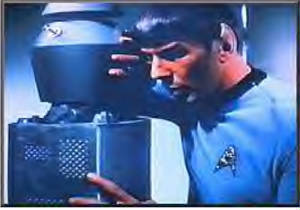
Spock: I am Nomad. Error. Error. Error.
Episode #41 “I, Mudd”:
The plot of this episode is fairly simple and
light-hearted. The Enterprise is captured by an android, named Norman, who brings
the ship to a K-class Planet, filled with other androids, and transports Kirk, Spock, McCoy, Uhura, and Chekov to the surface.
There they meet the other androids, and their ruler, Harcourt “Harry” Fenton Mudd the First. It becomes apparent
Mudd is on the lam, and in order to escape, intends to steal the Enterprise and maroon the crew there. This includes systematically
beaming the entire crew down to the surface, at which point Scotty joins them forcibly.
Throughout the rest of the episode, various aspects
of android life are highlighted in an attempt to seduce the Enterprise
crew. The only solution is to use illogical displays to confuse the androids into shutting down.
Each of the crew is tempted with a different
lure. Uhura is tempted with the aspect of eternal youth and beauty. Chekov is tempted with the possibility of having sex with
twins. Spock is tempted with the prospect of being around logic for the rest of his life. What tempts McCoy, however, is a
bit different.
McCoy: I could spend the rest of my life in those labs.
McCoy is tempted by the labs, wherein, among
other things, the machine that creates and maintains the androids is located. This could very well be because of his desire
to have such power, and the androids to serve.
The fate of the machine is never revealed. It
becomes obvious that the crew of the Enterprise used it to make 500 android copies of Mudd’s wife Stella in order to
punish him, and this can imply that perhaps one other android was made. However, since it’s never debated, the window
of opportunity is certainly there.
Androids are designated from everybody else by
the presence of a necklace with a numerical designation for each series upon it.
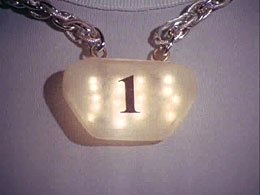
At the very least, if an android
Spock or android playmate hadn’t been created for McCoy’s amusement at some point during the episode, one of the
necklaces could have easily been swiped for some interesting role play back on the ship.
Episode #61 “Spock’s Brain”:
A more obvious example of the Spock/McCoy techno-sexual
fetish relationship occurs in this episode, which incidentally, is a far worse episode than the one above.
The plot of this episode is as thin as deli-cut
meats. The primitive descendents of an advanced race of humanoids come aboard the Enterprise and remove Spock’s brain so that it will
power the computer that controls their planet. This leads to the revelation of the fact that a Vulcan can survive for twenty-four
hours without a brain. This plot might be thin, but this is where the techno-sexuality comes into play.
In order to help Spock’s body live and
help Spock find his brain, the task falls to McCoy to construct a means of allowing Spock’s body to move. This results
in a helmet for Spock that McCoy controls via remote control.
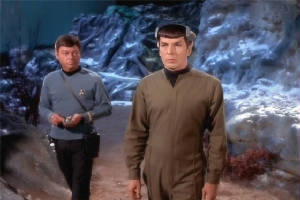
For the rest of the episode, Spock functions as a robot would. A command is
put in by his Controller, McCoy, via the electrical impulses of the remote.
The first question to arise is how exactly McCoy
managed to test out this remote control. And there’s a story to that effect. Click!
(http://www.trekiverse.org/startrek/startrek/adult/tos/Click_A) By Animasola
But the second most noticeable use of technology
in this episode is that of the Teacher, a peculiar mechanical device that can send knowledge deep into the brain, for a limited
period of time. This is, however, the equivalent of entering into a mind meld with a machine.
In an effort to save Spock’s life by reattaching
his brain, a skill not yet achieved by medical science of the twenty-third century, McCoy volunteers to undergo the experience
of the Teacher. And it might be noted that the expression on his face is similar to that on his face when he was absorbed
by Landru in Episode #22: The Return of the Archons.
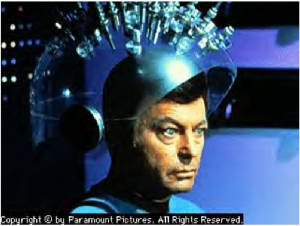
This somewhat unorthodox storybook
tale ends with Spock instructing McCoy on how to reattach his brain, when the effects of the Teacher wear off. In this very
moment, Spock may have achieved the perfect image of the Android. He has a very Vulcan body, but his brain is still somewhat
attached to the computer of the planet, and he’s still wearing the device that controls his nervous system. All the
while, he’s lecturing McCoy on the logical and correct approach to science. As strange as this might be, by this point
in time, McCoy has achieved the climax of his ultimate fantasy.
As I said at the beginning of this section, this
is simply my theory on a possible fetish of McCoy. I certainly do not speak for the Spock/McCoy community at large, or possibly,
for anybody else at all.
In Conclusion...
As this extremely long essay comes to an apparent
end, I think it necessary to find a proper way to sum up McCoy. Summarizing is
putting something ‘in a nutshell’. Spock/McCoy works because it’s not perfect. Perfection doesn’t
exist. But Spock/McCoy, with its peculiar interaction and its occasional flaws, is very real, and this is what makes it so
wonderful. But it’s important to remember that they never lose their banter, even in the most affectionate of moments.
And so perhaps the writer Amphioxus Obnoxious
says it best in hir mail signature:
Spock and McCoy, sitting in a Tree! (peach, of course)
A-R-G-U-
oh wait
K-I-S-S-I-N-G.
etc.
So You’d Like to Know More:
Thanks for taking the time to read
this essay. I know it was long, but at the very least, there were some nice pictures to break the monotony of the words. If
you’re interested in more Spock/McCoy slash, let me show you the following links. And yes, they’re more than slightly
biased.
The Spock/McCoyote's Den (http://spockmccoyote.tripod.com): This is the definitive collection of Spock/McCoy stories. If there’s a Spock/McCoy story on the Internet,
you can find it here. There’s also links to other sites of interest, screen caps of an S/Mc nature and plenty of slashy
artwork.
The Cub’s Side of the Mountain (http:// trekslasher.tripod.com): This is the All-Ages Spock/McCoy site. All stories, poems, and artwork on this site are rated from G to PG-13
so that even young fans of the pairing can enjoy slash without having to deal with more adult themes.
Spock/McCoy Haven (http://groups.yahoo.com/group/spockmccoyhaven): This is the only Yahoo Group dedicated solely to S/Mc. It has an ongoing Spock/McCoy Pairing Fest, where stories
are written about the scenario challenges assigned to them. The list is in the middle of The Twelfth Wave, at present. There’s
plenty of S/Mc discussion, and there’s a working bar. Plus, most of the fandom is here.
Spock/McCoy Haven (http://spockandmccoy.tripod.com): This is the official website for the above Yahoo Group. It shows off the stories written for each
Wave of the Fest. The site has archived all prior waves through the Eleventh Wave, and will host the Twelfth Wave stories
when it comes to a close.
Spiced Peaches (http://spockmccoyote.tripod.com/spicepeachesone): Prior to April 1st, 2005, there were no zines dedicated
solely to S/Mc. That situation has been remedied, with the newest e-zine “Spiced Peaches,” dedicated solely to
the idea of S/Mc slash. The first issue can be found at the above address and with the success of the first issue, more issues
will follow, and will be found at (http://spockmccoyote.tripod.com/spicedpeacheprime)Contributions are always welcome.
Peace and Long Life. _\\//
|
